|
June 2011 Updates
Parashat Chukat - פרשת חקת

[ The following entry concerns this week's Torah reading, parashat Chukat. Please read the Torah portion to "find your place" here. ]
06.26.11 (Sivan 24, 5771) Among other things, this week's Torah portion includes the unusual ritual law of the Red Heifer (parah adumah) whose ashes purify those contaminated by contact with death. This ritual is considered chok (חק) within the Jewish tradition, meaning that it makes no rational sense. The Talmud states that of all the commandments in the Torah, this is the only one that King Solomon could not fathom, causing him to exclaim: "I said I would be wise, but it is far from me" (אָמַרְתִּי אֶחְכָּמָה וְהִיא רְחוֹקָה מִמֶּנִּ, Eccl. 7:23). However, as you will see, the symbolism of the parah adumah is a clear foreshadowing of the sacrifice of the Messiah that delivers us the uncleanness of death.
Shabbat Rosh Chodesh
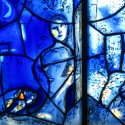
[ This coming Shabbat occurs on the "new moon," which makes it Shabbat Rosh Chodesh... ]
06.26.11 (Sivan 24, 5771) When the Sabbath day occurs on the "new moon," it is customary for an additional Torah reading (maftir) to be read during services: "At the beginnings of your months, you shall offer a burnt offering to the LORD" (Num. 28:11). In addition, a different Haftarah portion is read because it mentions the new moon celebrations that will be observed by the entire world after the Messiah returns to establish the Kingdom of God on the earth.
Rosh Chodesh Tammuz
On the Biblical calendar the fourth month of the year (counting from Nisan) is called Tammuz (תַּמּוּז) in the Jewish calendar. The name "Tammuz" is of Sumerian origin, and some scholars identify it as the name of a Sumerian sun god (Shamash or Dumuzid) who was thought to be responsible for the seasonal life/death/rebirth cycle. The idolatry of Tammuz was something God condemned (Ezek. 8:14), though despite the prophets warnings, the Israelites persisted in it, which led to the destruction of the Holy Temple. The Fast of the 17th of Tammuz marks the beginning of the "Three Weeks of Sorrow," a 21 day period of national mourning for the destruction of the Temple that is completed on Tishah B'Av.
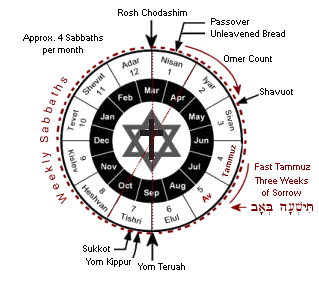 |
Rosh Chodesh Blessing
Since Rosh Chodesh Tammuz marks the beginning of a season of teshuvah (repentance) and the Three Weeks of Sorrow, we humbly ask the LORD to help us turn to Him with all our hearts:
יְהִי רָצוֹן מִלְּפָנֵיךָ יהוה אֱלהֵינוּ וֵאלהֵי אֲבוֹתֵינוּ
שֶׁתְּחַדֵּשׁ עָלֵינוּ חדֶשׁ טוֹב בַּאֲדנֵינוּ יֵשׁוּעַ הַמָּשִׁיחַ אָמֵן
ye·hi · ra·tzon · mil·fa·ne·kha · Adonai · E·lo·hei·nu · ve·lo·hei · a·vo·tei·nu
she·te·cha·desh · a·lei·nu · cho·desh · tov, · ba·a·do·nei·nu · Ye·shu·a · ha·ma·shi·ach · amen

"May it be Your will, LORD our God and God of our fathers,
that you renew for us a good month in our Lord Yeshua the Messiah. Amen."

Download Study Card
New "Table Talk" for Korach
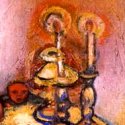
[ The following entry concerns this week's Torah reading, parashat Korach. Please read the Torah portion to "find your place" here. ]
06.24.11 (Sivan 22, 5771) It is encouraging and edifying to discuss the weekly Torah portion with your family and friends during the Friday night Sabbath meal. To make it a little easier to discuss some topics, I created a new Shabbat "Table Talk" guide for parashat Korach. The guide includes a brief summary of the Torah reading, a set of questions (with answers), and some additional topics for discussion. Hopefully this material will prompt some interesting (and enjoyable) discussion around your Sabbath table, chaverim. You can download the PDF file from the linked page (above) or by directly clicking here.
Note: Since the kids were sick this week and I spent so much time writing about the message of Jude (see the entry below), I had to rush to get this guide finished in time for Shabbat. Please forgive any typos you might see, chaverim. Shabbat Shalom - and may you be strong in our Yeshua our Master and LORD....
 |
The Message of Jude...
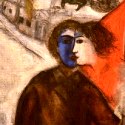
[ The following overview of the Book of Jude is related to this week's Torah reading, parashat Korach. Please read the Torah portion to "find your place" here. ]
06.23.11 (Sivan 21, 5771) Our Torah portion this week centers on the rebellion of Korach, a man who questioned God's authority and arrogantly sought to "intrude" into the office of the priesthood. It is noteworthy that his rebellion is explicitly mentioned only once in the New Testament - in the Book of Jude - as an example of the fate that awaits those false teachers who likewise despise God's law. Unfortunately, Jude's warning is often neglected today, probably because people feel uncomfortable over the prospect of God's judgment. After all, in our "politically correct" age, people have been indoctrinated to regard "tolerance" as the greatest of virtues and "intolerance" (even of evil) as the greatest of vices.... Most unbelievers don't mind hearing the "good news" of God's love, but they take exception when they are confronted with their personal duty to live according to the moral truth revealed in the Torah. False teachers within the church are dangerous because they feed on this sense of discomfort and attempt to rationalize it away. Jude identifies them as spiritual impostors who "work from the inside" to confound or obscure the truth of God. Such a charlatan may appear to be a genuine believer, but their hidden agenda is to sow confusion and sin among God's children. They are proverbial "wolves in sheep's clothing" (Matt. 7:15). Jude's warning is especially important for us to heed in this present hour, because in the time immediately preceding the coming of the Messiah, spiritual deception and unbridled godlessness will greatly increase (2 Tim. 3:1-5).
Jude (i.e., Judah: יְהוּדָה) was the brother of James, the original leader of the believers in Jerusalem who ardently called on followers of Yeshua to perform acts of righteousness to demonstrate genuine faith (James 1:22; 2:14-26). The Book of Acts records that it was James - along with the elders in Jerusalem - who advised the apostle Paul to demonstrate his allegiance to the Torah by offering sacrifices at the Temple (Acts 21:18-26). Both James and Jude were half-brothers of Yeshua, though at first they did not believe his messianic claims (John 7:5; Mark 3:31-34). After the resurrection Yeshua personally appeared to James (1 Cor. 15:7), who later became the leader of the original Messianic assembly in Jerusalem (Gal. 2:9). The events surrounding the conversion of Jude are not recorded in the New Testament, though in the salutation of his letter he simply identified himself as "a slave of Yeshua the Messiah and the brother of James" (Jude 1:1), assuming that his readers would be fully aware of his identity within the Messianic community. Jude apparently attached no weight to his earlier family relationship with Yeshua as his half-brother, especially in light of Yeshua's teaching that his true family were those who trusted in him (Matt. 12:48-49).
At first Jude had intended to write something else, but he then felt compelled by the Holy Spirit to warn us about the infiltration of false teachers and to "earnestly contend for (i.e., ἐπαγωνίζομαι, "agonize over") the faith that was once and for all delivered to the saints" (Jude 1:3). It should be noted here that there are strong correspondences between Jude's letter and Peter's second letter (i.e., 2 Pet. 2:1-3:3). Jude begins his letter by warning his readers that "certain people have crept in among you" who pervert the message of the grace of God by implying that we are free to sin (Jude 1:4). Notice that Jude said these men had "crept in" (παρεισδύω), a derogatory word that means they sidestepped or "entered around" the honest way.... The word translated "pervert" in this verse might better be rendered as "exchanged" or "turned around" (i.e., μετατίθημι), since these teachers "interpreted" God's grace to be "licentiousness" (ἀσέλγεια), that is, a license for sin. Perhaps these "creeps" taught that because of the sacrifice of Yeshua, the Torah of Moses was made obsolete, and therefore the "truth" of God was all about unconditional love based solely on faith -- regardless of our behavior. This is sometimes called "antinomianism" (from ἀντί, "against" + νόμος, "law"), a false doctrine that claims that a believer in Yeshua is freed from all laws (including the moral law of God expressed in the Torah). We find evidence of this "lawless" line of thinking in some of the writings of the early Greek "christian fathers."
It is important to see that the primary characteristic of a false teacher is that they "deny our only Master and LORD, Yeshua the Messiah" -- that is, they deny His moral authority and identity as the LORD God. Since Jude is writing to those who are "beloved by God," that is, to sincere Jewish believers, he is careful to remind us that it was Yeshua Himself who saved the people from Egypt -- but afterward destroyed those who did not believe (Jude 1:5). In other words, Jude wanted to ensure that we fully understand that it was Yeshua who was the thunderous "Voice of the Living God speaking from the midst of the fire" at Sinai (Deut. 5:26), and therefore to regard Him as none other than the great Lawgiver Himself (Matt. 5:17-7:29). That is why he is called "our only Master and LORD," and to esteem him as anything less is to deny the reality and truth of God.
Many churches today teach that we can (and should) disregard the moral law of God. They may give lip service to the "old testament," and they may claim it is still of historical interest that provides some interesting stories, but they arrogantly discount its essential message of holiness as being inapplicable to our daily lives. Often they are antinomian, teaching that we are no longer "under the law" and therefore are free to live in sin. Because they disregard (or "reinterpret") the clear moral teaching of the Torah (and the New Testament), they wink at fornication, support alternative "marriages," endorse gay clergy, and clamor for abortion rights. Many of the institutionalized churches promote syncretistic "replacement theology" that invent rituals, holidays, and symbols that are alien to the truth revealed in the Jewish Scriptures. These churches are often tolerant of "universalism," new age mysticism, and regard postmodern skepticism as "trendy." They may claim they are "seeker sensitive" but this is often "code" that they disregard the moral duty believers have to walk in personal righteousness. And because of their willful ignorance, some of these churches unthinkingly accept anti-Jewish propaganda - despite the irrevocable promises God has made to the Jewish people. Jude likens advocates of such doctrines to be "inhabitants of Sodom and Gomorrah" who will likewise be judged by God with eternal fire...
In this connection let me remind you of a verse from the New Testament: "Let no one in any way deceive you, for it [Yeshua's return] will not come until the apostasy (ἀποστασία) comes...." (2 Thess. 2:3). The word "apostasy" literally means "standing away" (ἀπό + ἵστημι) from the truth while making a pretense of abiding within it. In Hebrew, the word is meshuvah (מְשׁוּבָה), one who "turns away" from God. It is not a word that describes an unbeliever as much as it describes a traitor.... Some people think there will be a great time of revival just before Yeshua returns, but unfortunately that is not true. Indeed, Yeshua asked if he would find anyone who had faith at that time (Luke 18:8). At any rate, Jude states that those who "creep into" congregations to teach truth contrary to the revealed will of God are apostates, and the judgment they face is terrible to consider.
Jude reminds us that God is the same "yesterday, today, and forever," and His moral will was not suspended or "superseded" through the advent of Yeshua. Indeed, Yeshua clearly amplified the teaching of the Ten Commandments, insisting that they were to be obeyed from the heart, not merely adhered to as an external law code (Matt. 5:21-48). After all, it was Yeshua Himself who saved the Israelites from Egypt and led them to Sinai but who later destroyed those who did not believe (Jude 1:5). The Exodus generation fully understood the promise of God: "I will bring you out from under the burdens of the Egyptians; I will deliver you from slavery to them; I will redeem you with an outstretched arm and with great acts of judgment; I will take you to be my people... and I will bring you into the land that I swore to give to Abraham, Isaac, and Jacob" (Exod. 6:7-8). They understood all this - and they had personally experienced God's direct intervention - yet they failed to believe and therefore were decreed to wander about in the desert until they perished.
A false teacher is a pretender - someone who masquerades as a sincere believer. Paul described them as "deceitful workers, disguising themselves as apostles of Messiah" who therefore mimic the workings of Satan who disguises himself as an "angel of light" (2 Cor. 11:13-14). They have an outward show of spirituality, but ultimately they deny its reality and power (2 Tim. 3:5-6). Jude calls them "dreamers" (ἐνυπνιαζόμενοι), charismatic teachers who claim they receive direct messages from God. Invariably these people defile the flesh and question divine authority, particularly the authority of God as our moral lawgiver. They arrogate to themselves great "knowledge" by claiming that they are the recipients of special revelation that negates the plain meaning of the Scriptures. Ultimately, they slander what they do not naturally understand and ironically are destroyed by their carnal instincts, which they claim is the source of their revelation (Jude 1:8-10).
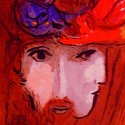
Jude then uttered a woe of denunciation upon false teachers, whom he likened as "spiritual descendants" of three notorious sinners mentioned in the Torah (Jude 1:11). First he said these teachers follow the "way of Cain" (דֶרֶךְ קַיִן), who was the earliest example of one who willfully chose the path of evil. Cain was a "natural man" who believed that his own efforts to find favor with God were sufficient. Unlike his righteous brother Abel, Cain denied the need for blood atonement by refusing to sacrifice a little lamb. His self-styled religion led him to offer up fruit from the earth. Cain disregarded the promise God gave to his parents about the Promised Seed and ignored the covering of grace that God had given them. His character of heart was later revealed when he murdered his brother in a fit of jealous rage.
Next Jude says false teachers follow the "error of Balaam" - the corrupt prophet who sought to curse Israel. The apostle Peter mentioned "the way of Balaam, the son of Beor, who loved gain from wrongdoing" (2 Pet. 2:15), and the Book of Revelation mentioned "the teaching of Balaam, who taught Balak to put a stumbling block before the sons of Israel" (Rev. 2:14). Balaam was a spiritual hireling who used his talents to obtain money, fame, applause, respect, and so on. He was a spiritual prostitute who wanted to sell his services without regard for the truth (Num. 22:7, Deut. 23:4-5). Though he appeared to follow God's instructions, his inner attitude was actually hostile to God's desire and plan. He was therefore double minded, antagonistic to the way of truth, and therefore literally insane (2 Pet. 2:16). When Balaam told King Balak's emissaries that he could "only speak what God put in his mouth," he was being literal, not moral... This is revealed in the fact that he was willing to try three times to curse God's purpose, but every time God thwarted his evil intent.
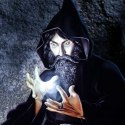
It is interesting to note that the name Balaam (בִּלְעָם) means "not of the people," which alludes to the fact that he sought to curse the Jewish people and bring them into judgment. Despite being miraculously rebuked by his donkey - and directly warned by the LORD Himself - Balaam continued to plot against Israel until he finally was successful by using women from Moab to seduce the men of the camp at Baal Peor (Num. 31:16). Since he was foiled in his attempts to directly curse Israel, Balaam reasoned that seducing Israel to sin was the way to eventually bring them to ruin. But Balaam forgot that God was not only Israel's Judge, but also Israel's Savior. He was later killed by the sword while fighting the Israelites before they entered the Promised Land (Num. 31:8).
Finally, Jude likened false teachers to Korach who rebelled against the LORD. Korach, as we know from our Torah portion (Korach), was discontented with his lot and sought to obtain power by arrogating the office of the priesthood for himself. He was consumed with envy and resentment because he was not chosen to be a preeminent leader among the people, and therefore he attacked Moses and questioned the authority of his teaching. Korach wanted to be center-stage in God's plan, and when he realized that he wasn't, he felt mortified over his status. Ironically, Korach's slanderous accusation that Moses and Aaron "exalted themselves above the assembly of the LORD" was the hidden reason why Korach sought to rebel. Korach's lust for power finally consigned him to a state of hardened defiance, which moved him to attempt to overthrow God's order.
On the surface, Korach certainly looked good. As a Kohathite, he had a lot of credibility. He was Moses' cousin, after all, who shared the same family tree reaching back to the chosen son of Levi himself. And he was undoubtedly intelligent and eloquent as well. You can almost hear him talking with Dathan and Abiram, consoling them for being "second class" citizens in Israel, disingenuously arguing for a return to the "good old days" of Jewish religious life in Egypt, when all firstborn sons were accorded equal stature in the eyes of God... But of course we know how the story ends: Korach's lust for power and arrogant repudiation of God's law brought swift and terrible judgment as he was swallowed up alive by the earth. Notice that Jude describes Korach's "rebellion" using the word antilogia (ἀντιλογία), which means to "speak (λέγω) against (ἀντί)," or to contradict the word of truth (Jude 1:11). Jude's point is that teachers who seek personal power by denying the authority of God's Torah will suffer a fate similar to Korach...
To quickly summarize, Jude warned us that false teachers would deceptively "creep into" our midst, and therefore he sought to expose them by revealing their inner motivation and character. First of all, they would (secretly) deny that Yeshua is Master and LORD and promote license to sin by denying the authority of the Torah. They would masquerade as true believers, and claim to receive special revelations from God. Inwardly, they would be carnal and self-righteous, like Cain; they would be treacherous and greedy, like Balaam, and they would be jealous for power and contrary, like Korach.
Jude then used a metaphor to say that false teachers are like "hidden rocks" that cause shipwreck when a ship seeks harbor (Jude 1:12). They attend fellowship meals, ravenously feeding themselves without reverence before God, and therefore are a danger to others. They are deceptive in their words and are likened to "waterless clouds" that appear to be life-giving, but are empty and dry. They are "fruitless trees in late autumn, twice dead, uprooted," indicating that their lives are devoid of the fruit of the Spirit. They are "wild waves" and "wandering stars," who follow their own lawless course (Jude 1:12-13). They are experts at giving an opinion, ranting about politics or world events, but they disregard the plain message of the Scriptures to live in holiness and faith. To them, Jude says, is reserved the blackness of darkness forever -- a terrifying image of hell -- and upon them will be fulfilled the prophecy of Enoch regarding divine retribution that is promised to the ungodly at the end of the age (Jude 1:14-15).
But Jude is not finished describing the hidden character of these dangerous impostors. "They are grumblers, malcontents, following their own sinful desires; they are loudmouthed boasters, showing favoritism to gain advantage" (Jude 1:16). Here Jude notes that false teachers are essentially "man pleasers" who flatter others (or seek applause) for their own personal advantage. They rant about spiritual things with an aim to inciting the flesh. As entertainers, they seek the approval of the crowd and delight to impress an audience. Many of them are "ear-tickling" hucksters who make a living by peddling carnal doctrines on television or on radio. Others promote themselves as "specially anointed" teachers and prophets who "fleece the flock" by making empty boasts... These are those charlatans and snake-oil salesmen who cruelly offer you a "miracle" -- but only if you offer up cash for the benefit... Still others are professors in seminaries who hide their unbelief by "deconstructing" the Scriptures and intellectualizing the faith. These professors often function as denominational "gate keepers" to create "professional clergy" prepared to serve in institutionalized churches. Jude reminds us that the apostles and Yeshua Himself warned us that such mockers would come who would make a pretense of the faith while pursuing their own ungodly desires. These are teachers who cause divisions and are "sensual (ψυχικός, literally soulish), devoid of the Spirit" (Jude 1:17-19).
The description that false teachers are "soulish" (ψυχικός) but "without the Spirit" clearly identifies them as unregenerated people, and by implication, this description provides some insight into the nature of a regenerated person as well. The "natural man" is a fallen creature who is devoid of spirit (ruach) as a result of the inherited sin condition of Adam and Eve. As such, he is alienated from the Spirit of God (Ruach Hakodesh) and unable to apprehend the Divine Presence. Such a person is composed primarily of body (i.e., basar) and a soul (i.e., nefesh), and the will instinctively is directed toward the satisfaction of the ego and its needs. The "heart" (lev) of such a person is centered in the lower desires of the soul, which drives the emotions, instincts, and so on. When a person is reborn by the Holy Spirit, however, he is made into a new creation (בְּרִיאָה חֲדָשָׁה) and a "rebirthed spirit" is divinely imparted by which he can communicate with God. The Holy Spirit then writes the Torah upon a new heart (i.e., lev chadash) that directs the will to seek the LORD and to live in His Presence:
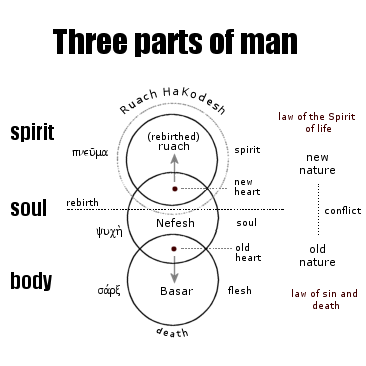 |
This "tripartite" model of the regenerated person helps explain the struggle we have with sinful impulses in our lives. The "new nature" seeks to please God, yet the "old nature" selfishly desires to gratify the instincts of the flesh. These desires find their correspondence in the "law of the Spirit of life" and the "law of sin and death," respectively. "For the desires of the flesh are against the Spirit, and the desires of the Spirit are against the flesh, for these are opposed to each other, to keep you from doing the things you want to do" (Gal. 5:17). We are set free from this conflict by faith - by being led by the power of the Holy Spirit. "If we live by the Spirit, let us also walk by the Spirit." Our relationship with the "Second Adam" imparts to us life-giving spirit (1 Cor. 15:45), and the resurrection of Yeshua gives us power to walk in newness of life. "Just as we have borne the image of the man of dust, let us also bear the image of the man of heaven" (1 Cor. 15:49). "Now may the God of peace himself sanctify you completely, and may your whole spirit (רוּחַ) and soul (נֶפֶשׁ) and body (גְּוִיָּה) (i.e., τὸ πνεῦμα καὶ ἡ ψυχὴ καὶ τὸ σῶμα) be kept blameless at the coming of Yeshua our Messiah and LORD" (1 Thess. 5:23). We are sanctified by the truth of the Word of God (John 17:17), which pierces "even to the point of dividing soul from spirit (ψυχῆς καὶ πνεύματος), and joints from marrow" (Heb. 4:12).

We can guard against false teachers by using discernment to test their spirits (1 John 4:1), but we can only be equipped to do so if we "build ourselves up in the most holy faith" (Jude 1:20). We build ourselves up by carefully studying the word of God - especially the Torah, since it is the foundation of all that follows. In this way we will be able to accurately wield the Sword of the Spirit (2 Tim. 2:15-16, 2 Pet. 1:19-20). In order to grow, we must have "good soil" for the seed of the word to take root. We "get rooted by knowing the roots" of our faith! Studying the Scriptures and praying in the Holy Spirit keeps us securely in the love of God as we wait for the mercy of Yeshua who gives us eternal life (Jude 1:21). This will equip us to show mercy to those who have honest doubts and to save those who are defiled by sin (Jude 1:22-23).
Jude's benediction at the end of his letter is beautiful and profoundly reassuring, since it magnifies God's salvation secured to us through Yeshua our LORD: "Now to him who is able to keep you from stumbling and to cause you to stand blameless before the presence of his glory with great joy, to the only God, our Savior, through Yeshua the Messiah our Lord, be glory, majesty, dominion, and authority, before all time and now and forever. Amen" (Jude 1:24-25).
Wow... what a powerful and timely message!
Let me add only that Jude's warning is primarily given so that believers will be on guard for false teachers in their midst. Though we must "test ourselves to see if we are in the faith" (2 Cor. 13:5), we are given the Spirit of truth (רוּחַ הָאֱמֶת), so we can know the truth revealed by God (1 Cor. 2:10-14; 1 John 4:6). This is not meant to suggest that we know everything, of course, since we walk by faith and presently "see through a glass darkly." Nevertheless we can find great comfort when we understand that God has solemnly promised to help us to persevere in the way of truth. We must continue trusting in His providential care for us as we make our way back home.
One final thought. Godly teachers deserve our support and prayers, since they are appointed by God Himself to "equip the saints" for service (Eph. 4:11-13). Indeed, the ministry of accurately sharing the truth of the Scriptures is more vital than ever in this day of great apostasy. So please - support those teachers out there that are earnestly laboring to make the voice of truth be heard in this world... Some people tend to regard sound teaching as something that should be given out freely, though the Scriptures are clear that "one who is taught the word must share all good things with the one who teaches" (Gal. 6:6; 1 Cor. 9:11, 14, 1 Tim. 5:18). On the other hand, teachers are warned that they must accurately teach (ὀρθοτομέω, lit. "cut straight") the message of truth (2 Tim. 2:15) and will be subject to a stricter judgment than other believers for the content of their teaching (James 3:1).
The Hebrew word for education is chinukh (חִנּוּךְ), a word that shares the same root as the word for "dedication" (i.e., chanukah: חֲנֻכָּה). True education of the Scriptures is therefore foundational to being a student of the Messiah. All disciples of Yeshua are called "students," or talmidim (תַּלְמִידִים), a word that comes from lamad (לָמַד) meaning "to learn" (the study of Scripture is called talmud Torah (תַלְמוּד תּוֹרָה) from the same root). Among other things, then, following Yeshua means becoming a student of the Jewish Scriptures that He loved and fulfilled (Matt. 5:17-18; Luke 24:44-45). Only after learning the truth of the Scriptures will you be equipped to "go to all the nations and teach" others (Matt. 28:19). This is accomplished not merely by explaining (propositional) doctrine but by kiddush HaShem -- sanctifying the LORD in our lives (1 Pet. 1:15-16). As the sages noted long ago: "Upon three things the world does stand: upon the Torah (truth), upon worship, and upon acts of lovingkindness" (Avot 1:2). We are called to be a "living letter" sent to the world to be "read" (2 Cor. 3:2-3).
Yeshua promises those who put their trust in Him: "You will know the truth, and the truth will set you free" (John 8:32). May God watch over you, keep you, and give you the glorious liberty to obey Him in the truth, chaverim....
 |
Parashat Korach - פרשת קורח
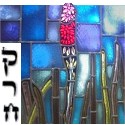
[ The following entry concerns this week's Torah reading, parashat Korach. Please read the Torah portion to "find your place" here. ]
06.20.11 (Sivan 18, 5771) Last week's Torah portion (Shelach) told the tragic story about the "sin of the spies" (chet ha-meraglim) and of the divine decree that the generation of Israelites rescued from Egypt was sentenced to die while in the desert. In this week's portion (Korach), the hard truth of their condition began to sink in, and the people bemoaned their fate and rebelled further by attempting to overthrow the Lord's designated leadership and return to Egypt. This rebellion was instigated and organized by Moses' cousin Korach, who - along with a band of co-conspirators - was swiftly judged and put to death, thereby vindicating the Aaronic priesthood and Moses' leadership of Israel.
Korach was the cousin of Moses and a well-respected Kohathite who was honored to be one of the carriers of the Holy Ark. He was renowned as a wealthy man of influence - a nassi (prince) of the people. However, despite all this privilege, Korach wanted more. Korach rationalized that he should be the head of the Kohathite clan (instead of his cousin Elzaphan), since he was the firstborn of Kohath's second son, whereas Elzaphan was the not even a firstborn son. Indeed, because he felt slighted by Moses' choice of Elzaphan, Korach went further and brazenly questioned whether the office of the High Priest should not have been given to him - rather than to Aaron (Num. 16:10).
The battle between Korach and Moses/Aaron was a sort of "palace intrigue" based on family rivalries. It is incorrect to regard this as a struggle between the Levites (as a whole) and the priests, since the Levitical clans of Gershon and Merari were not a part of Korach's rebellion. Instead, it was a battle within the Kohathite clan itself - or rather, between the Kohathites and the subset of their clan that was given the honor of the priesthood (i.e., Aaron and his sons). Ultimately, of course, the battle was between Korach and God Himself, since Korach's complaint centered on God's decision to exclusively chose Moses and Aaron to lead the people of Israel. To better understand the tensions running within this most influential family of ancient Israel, consider the genealogy of Levi (from Exodus 6) that shows the relationship between the various grandsons of Kohath:
 |
The Midrash Rabbah states, "Korach argued: My father was one of four brothers; as it says, "And the sons of Kehat: Amram, and Izhar, Hebron, and Uzziel" (Exod. 6:18). As for Amram the firstborn, his son Aaron attained to greatness and Moses to royalty. Who then should rightly take the next office? Is it not the next in line? Now I, being the son of Izhar, should by right be the leader of the Kohathites, yet Moses appointed the son of Uzziel! Shall the son of the youngest of my father's brothers be superior to me? Behold, I shall dispute his decision and put to naught all that has been arranged by him."
According to Jewish tradition, Korach was accustomed to power in Egypt. The midrash states that he gained his great wealth by discovering some of the treasures that Joseph had hidden in Egypt which he took for himself. It is possible that he served as a liaison with the Egyptian royalty and helped organize the taskmasters. Indeed, Korach appeared to have lived as a "prince" back in Egypt.... At any rate, after the disaster of the Sin of the Spies and the unhappy prospect of interminable wandering in the desert, Korach presented himself as a "man of the people" who (disingenuously) sought to restore the "old rule" to Israel (see the "Madness of Korach"). He therefore co-opted the animosity that the Reubenites felt toward Moses and the Levites to create a popular movement to decentralize power by campaigning for the law of primogeniture (the right of the firstborn). Therefore the midrash says that all 250 men who joined the rebellion were firstborn sons.
In the opening verse of the portion we encounter the names Dathan and Abiram for the first time. According to Jewish tradition, these men were a constant source of trouble to Moses, even from the beginning. Dathan was said to be the man whom Moses saved from the brutality of the Egyptian taskmaster (Exod. 2:11-14). Instead of expressing gratitude to Moses, however, Dathan immediately reported him to Pharaoh and further disclosed that Moses was a "closet" Hebrew -- not an Egyptian at all -- which caused Moses to flee for his life to the land of Midian (Yalkut Shemoni).
After the Exodus, when the chariots of Pharaoh were closing in on Israel at the Red Sea, we read, "And they said to Moses, 'Are there not enough graves in Egypt that you brought us into the wilderness to die? Why did you bring us out of Egypt?'" (Exod. 14:11). The midrash says that the unnamed "they" in this verse were none other than Dathan and Abiram. Later, when the LORD gave manna to feed the people, Moses instructed not to leave any left over for the following day. "But they did not listen to Moses and the men left over some of it for the next morning and it became infested with worms (Exod. 16:20). Rashi identifies these men as Dathan and Abiram. Most seriously, when the spies returned with their evil report about the Promised Land, we read, "And a man said to his fellow, 'Let us appoint a leader and we will return to Egypt" (Num. 14:4). This "man and his fellow" were also said to be Dathan and Abiram (Shemot Rabbah). Now in our Torah portion we will encounter these two characters for the last time, as Dathan and Abiram are named as co-conspirators with Korach who led the insurrection against Moses and Aaron: "You have gone too far! For all in the congregation are holy, every one of them, and the LORD is among them. Why then do you exalt yourselves above the assembly of the LORD?" (Num. 16:1-3).
In response to their challenge, Moses first proposed that there would be a "Divine test" the following morning to see who is truly chosen by God. He told Korach and his cohorts to bring firepans to offer incense at the Tabernacle to determine whether they were indeed worthy to function as priests. Then he exposed Korach's ulterior motive for seeking the honor of the priesthood for himself (Num. 16:8-11). Moses then called for Dathan and Abiram to cease from the rebellion, but they mocked him when they were summoned, saying, "Is it a small thing that you have brought us up out of a land flowing with milk and honey (i.e., Egypt!), to kill us in the wilderness, that you must also make yourself a prince over us? Moreover, you have not brought us into a land flowing with milk and honey, nor given us inheritance of fields and vineyards.... We will not come up" (Num. 16:12-14).
The following morning, Korach and the 250 rebels took their firepans and assembled at the gate of the Tabernacle to challenge Moses and Aaron. "Then Korah assembled all the congregation against them at the entrance of the tent of meeting. And the glory of the LORD appeared to all the congregation" (Num. 16:19). The LORD then told Moses and Aaron to separate themselves from the evil assembly so that He could destroy them instantly. Moses then begged God not to destroy all the people, but only the rebels. The LORD then instructed Moses to warn the Israelites, "Get away from the dwelling of Korah, Dathan, and Abiram." Before the judgment of God was delivered, however, Moses made one last appeal to Dathan and Abiram to be spared destruction. Instead, they hardened their hearts: "And Dathan and Abiram came out and stood (יָצְאוּ נִצָּבִים) at the door of their tents, together with their wives, their sons, and their little ones" (Num. 16:27). Rashi comments that by "standing erect" (nitzavim) Dathan and Abiram publicly defied and even taunted Moses.
After he warned the congregation to stand clear, Moses announced that God would vindicate his leadership in the following manner: if the rebels died a natural death, Moses would be proven wrong; if, however, the rebels were swallowed by the earth, then his authority would be confirmed. As soon as he finished his announcement, Korach, his entire family (with the exception of his sons) and all his followers were swallowed up by the earth. "And fire came out from the LORD and consumed the 250 men offering the incense."
Korach's rebellion introduced outright mutiny and chaos within the leadership of the camp that brought swift and terrible rebuke from the LORD. Nevertheless, despite having witnessed the terrible judgment upon Korach and his followers, the very next day the entire congregation of Israel began to accuse Moses and Aaron, saying: "You have killed the people of the Lord" (Num. 16:41). When the people looked toward the Tabernacle, however, the Glory of the LORD appeared, where God descended to tell Moses and Aaron that he was going to destroy the Israelites for their treason. Despite Moses' and Aaron's fervent intercession, however, a deadly plague broke out among the people. Moses then instructed Aaron to take his fire pan with ketoret (incense) and bring it in the midst of the congregation to make atonement for them (though this was not part of the ritual use for ketoret). Aaron did so, "and he stood between the dead and the living; and the plague was stayed." The Torah tells us that 14,700 Israelites died because of the plague, not including the deaths of those involved in the rebellion of Korach.
The New Testament not only warns of the terrible apostasy of the Sin of the Spies (Heb. 3:7-4:2), but also refers to the ensuing rebellion of Korach (Jude 1:11). Notice that the word translated "rebellion" (or "gainsaying") comes from the Greek word antilogia (ἀντιλογία), which means to "speak (λέγω) against (ἀντί)" or to contradict the word of truth. "Now I want to remind you, although you once fully knew it, that Yeshua (i.e., κύριος), who saved a people out of the land of Egypt, afterward destroyed those who did not believe" (Jude 1:5). (Yes, you read that verse correctly: It was Yeshua who saved the Israelites from Egypt, as evidenced by the immediately preceding verse that says that those who pervert the grace of God into sensuality are those who deny "our only Master and LORD (i.e., κύριος), Yeshua the Messiah" (τὸν μόνον δεσπότην καὶ κύριον ἡμῶν ᾽Ιησοῦν Χριστὸν)). Referring to those who were destroyed because of their unbelief, Jude continues, "these people blaspheme all that they do not understand, and they are destroyed by all that they, like unreasoning animals, understand instinctively. Woe to them! For they walked in the way of Cain and abandoned themselves for the sake of gain to Balaam's error and perished in Korah's rebellion.... These are grumblers, malcontents, following their own sinful desires; they are loud-mouthed boasters, showing favoritism to gain advantage" (Jude 1:10-11, 16).
There is a word of hope in all of this, even in light of the terrible episode of Korah and the rebels... The New Testament says, "Whatever was written in former days was written for our instruction, that through endurance and through the encouragement of the Scriptures we might have hope" (Rom. 15:4, 1 Cor. 10:11). Even though Korach died by being swallowed up alive by the earth, his sons (Assir, Elkanah, and Aviasaph) apparently escaped their father's fate by exercising teshuvah. Indeed, no less than eleven psalms are ascribed to the "descendants of Korach" (בְּנֵי־קרַח), including Psalms 42, 44-49, 84-85, 87-88. Even the great prophet Samuel was Korach's descendent (1 Chron. 6:22-28).
In olam hazeh, people are given the choice whether to walk the "way of Cain" (בְּדֶרֶךָ קַיִן), to seek the spurious riches of Balaam, perish in the rebellion (ἀντιλογίᾳ) of Korach, or to turn to the Living God in teshuvah (repentance). One lesson of Korach is that those who impugn the truth of God will ultimately be "swallowed up" alive. The choice is ultimately our own which path we are taking...
A final note of encouragement comes from Jude, who gave us such a sober warning about the rebellion of Korach: "Now to him who is able to keep you from stumbling and to present you blameless before the presence of his glory with great joy, to the only God, our Savior, through Yeshua the Messiah our LORD, be glory, majesty, dominion, and authority, before all time and now and forever. Amen." (Jude 1:24-25). We are saved by trusting in the love of the LORD and His salvation, and God helps us to persevere in the truth.... We must continue trusting in His providential care for us as we make our way back home.
Personal Update: My sons and wife are suffering from a bad cold and I humbly ask for your prayers for their healing, chaverim. I likewise am in need of your prayers. Thank you!
 |
Small in our Eyes...
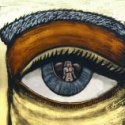
[ The following entry concerns this week's Torah reading, parashat Shelach Lekha. Please read the Torah portion to "find your place" here. ]
06.17.11 (Sivan 15, 5771) Our Torah portion this week (Shelach) is a "heavy one" since it focuses on the Sin of the Spies and the subsequent failure of the people to trust that God would care for them. The people's lack of bittachon in God is the most serious sin recorded in all the Torah, even more serious than the sin of the Golden Calf. This is confirmed by the testimony of the New Testament, which presents the fate of the Exodus generation as the dire warning of apostasy for those who claim to follow the Messiah (Heb. 3:7-4:2).
Notice, however, that to trust God, you must believe that you are valuable to Him and that He genuinely desires a relationship with you. God redeemed you so you could know and love Him. In this connection it is important to notice that the spies said, "we were in our eyes like grasshoppers" (Num. 13:33). They felt small because they had forgotten the reason for their redemption - they had forgotten their identity as God's children. Their lack of self-respect made them feel unworthy of the inheritance. The sin of the spies was not just that they doubted they could overcome the "giants in the land," but rather that they were worthy people in God's eyes... Sadly the spies view of themselves was more real to them than God's view of them, and that is why they added, "and so we were (like grasshoppers) in their eyes."
One lesson we can learn from the unbelief of the spies is that we must be careful to esteem ourselves properly. We are created b'tzelem Elohim (in the image of God), and that is the starting point for everything else revealed in the Torah. This foundational idea may be expressed as "respect precedes Torah." Self-esteem and self-worth are very important characteristics because they enable the soul to receive the Word of God. This isn't a selfish, narcissistic type of love. If you have no self-worth, then it is likely you will believe the promises of Scripture are for other people, but not for you. You will regard yourself as an "outsider" or "alien" who is without promise of inheritance. So we have to begin there, with the fact that God created you in His image and therefore you are of infinite value. You matter to God - and therefore you must respect yourself. It is no mark of holiness to shame or belittle yourself - notwithstanding your sinful nature - since you have a duty to honor yourself as one of God's created children. Dishonoring yourself violates the central ethical commandment of the Torah: "You shall love your neighbor as yourself" (Lev. 19:18). How can you respect others if you don't respect yourself? You will regard yourself as "insect like" and will tend to view others as "gigantic" threats; you will act defensively and walk in fear of other people.... This is the path of a person living in a prison of fear, and it is a type of hell. Trusting in God's personal love for you presupposes that you are worthy to be loved and that there is a divine inheritance for you. This gives you real courage to go take possession of the land as its rightful heir. Trusting in God means regarding God's view of you as more real than your own. It means allowing yourself to be elevated to honor so that you can be in a genuine love relationship with your Heavenly Father. "From now on, therefore, we regard no one (including ourselves) according to the flesh..." (2 Cor. 5:16).
We "walk by faith, not by sight," which means we must take hold of the promise of God, even in a world that "devours its inhabitants" and that is filled of seemingly invincible giants... Faith believes the possible, even in moments of testing and struggle. As Yeshua said, "All things are possible for the one who believes" (Mark 9:23).
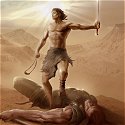
"God is able to make all grace overflow to you, so that having all sufficiency in all things at all times, you may overflow in every good work" (2 Cor. 9:8). May it please God our Heavenly Father to help us esteem ourselves properly so that we can receive, abide in, and walk in the reality and presence of His overflowing love. And may the LORD keep us all from the terrible sin of unbelief by always remembering that we infinitely matter to Him. Amen.
New "Table Talk" for Shelach

[ The following entry concerns this week's Torah reading, parashat Shelach Lekha. Please read the Torah portion to "find your place" here. ]
06.16.11 (Sivan 14, 5771) It is encouraging and edifying to discuss the weekly Torah portion with your family and friends during the Friday night Sabbath meal. To make it a little easier to discuss some topics, I created a new Shabbat "Table Talk" guide for parashat Shelach Lekha. The guide includes a brief summary of the Torah reading, a set of questions (with answers), and some additional topics for discussion. Hopefully this material will prompt some interesting (and enjoyable) discussion around your Sabbath table, chaverim. You can download the PDF file from the linked page (above) or by directly clicking here.
Fighting Darkness...

06.15.11 (Sivan 13, 5771) Some of you may wrestle with anxiety, or even a type of "spiritual dread" that defies rational explanation. Or you might experience a sense of grief or loss that seems to reach down to your very core, though you don't understand why... When such emotions arise within us, it's important to ask the LORD for wisdom. In general, pain is a messenger of sorts. Sometimes "general anxiety," that is, a feeling of unease with an unidentified cause, may result from being dishonest with ourselves. In such cases, we should first engage in cheshbon ha-nefesh (soul searching) and turn to the LORD in heartfelt confession. We should also seek the support and counsel of a trusted friend, if one is available. Self care - shemirat haguf (care of the body) is also vital for us to stay strong. Eating a healthy diet, exercising, and getting enough sleep can often eliminate a lot of emotional turmoil in our lives. I like the acronym H.A.L.T. Ask yourself if you are "hungry, angry, lonely, or tired" and then take steps to center yourself... Take a deep breath to help you regain your focus. (Of course, in some cases, there may be purely physical or organic cause for emotional distress, and we might need outside help from a professional, though we need to exercise discernment regarding the use of medications, etc.).
Dread, on the other hand, might be the result of outright oppression from the enemy that needs to be dealt with on a different level, in terms of spiritual warfare. In such cases, the important thing is not to understand why the attack is occurring, but rather to "fight the good fight of faith." To find victory, we often must "push back" against the pressure by consciously choosing to pray and offer praise. "In God, whose word I praise, in the LORD, whose word I praise, in God I trust; I shall not be afraid" (Psalm 56:10-11) - not only of what man may do to me - but also of the inner struggle of soul of which I do not understand.... This is where we appeal to God for help in the battle against the enemy of our souls and trust in His provision. We put on the "whole armor of God" to withstand in the "evil day," and having done all, to stand firm (Eph. 6:11-18). The weapons of our warfare are not carnal, but have divine power to destroy enemy strongholds and to defeat the devil's tactics (1 Cor. 10:4). Singing praises to our LORD is a powerful tool for announcing God's triumph over the darkness of the moment. Indeed, God Himself is "enthroned" by the praises (תְּהִלּוֹת) of His people (Psalm 22:3).
הִנֵּה אֵל יְשׁוּעָתִי אֶבְטַח וְלא אֶפְחָד
כִּי־עָזִּי וְזִמְרָת יָהּ יְהוָה
וַיְהִי־לִי לִישׁוּעָה
hin·nei · El · ye·shu·a·ti · ev·tach · ve·lo · ef·chad,
ki · o·zi · ve·zim·rat · Yah · Adonai
vai·hi · li · li·shu·ah

"Behold, God is my salvation; I will trust, and will not be afraid;
for the LORD God (יָהּ יְהוָה) is my strength and my song,
and he has become my salvation."
(Isaiah 12:2)
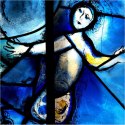
Download Study Card
"Do not be grieved, for the joy of the LORD is your strength" (Neh. 8:10). Affirming the love, goodness, faithfulness, compassion, and salvation of God is a powerful way to defeat the enemy of our souls, who regularly seeks to discourage us. King David constantly asked God to help him in his spiritual struggles. "I have set the LORD always before me; because he is at my right hand, I shall not be shaken" (Psalm 16:8). "Though I walk in the midst of trouble (בְּקֶרֶב צָרָה), you preserve my life; you stretch out your hand against the wrath of my enemies, and your right hand delivers me" (Psalm 138:7). "For the enemy has pursued my soul; he has crushed my life to the ground; he has made me sit in darkness like those long dead. Therefore my spirit faints within me; my heart within me is appalled" (Psalm 143:2-3). Despite whatever struggle we may face, "the LORD is near to the brokenhearted and saves the crushed in spirit (Psalm 34:18). He promises to be "near to all who call on Him in truth."
קָרוֹב יְהוָה לְכָל־קרְאָיו
לְכל אֲשֶׁר יִקְרָאֻהוּ בֶאֱמֶת
ka·rov Adonai le·khol ko·re·av,
le·khol a·sher yi·kra'u·hu ve·e·met

"The LORD is near to all who call on him,
to all who call on him in truth"
(Psalm 145:18)
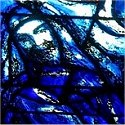
Download Study Card
So chazak v'ematz (חֲזַק וֶאֱמָץ) - "Be strong and courageous" (Josh 1:9; Eph. 6:10). God will see to it that everything will work out for the best. He works "all things together for good" to those who love Him (Rom. 8:28). Do not lose heart, even in dark moments of testing. Chazak chazak v'nitchazek – "Be strong, be strong, and may we be strengthened!"
Postscript: I realize that despite knowing what we should do, we often just don't do it. For example, we might know that we should watch our weight, but we go ahead and indulge ourselves anyway... Sometimes we have to ask God for the "willingness to do His will" since we find ourselves trapped in self-defeating behavior. May God show us grace and mercy...
Emunah and Bittachon...
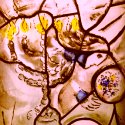
[ The following entry concerns this week's Torah reading, parashat Shelach Lekha. Please read the Torah portion to "find your place" here. ]
06.14.11 (Sivan 12, 5771) Since our Torah portion this week (Shelach) tells the tragic story of how the Exodus generation lost their inheritance by believing the faithless report of the spies, I thought it would be helpful to review the nature of faith so that we might guard ourselves from stumbling in a similar way. After all, concerning the decree of God regarding the Israelites in the desert (Num. 14:21-35), the New Testament admonishes Christian pilgrims, "Let us therefore fear, lest, a promise being left us of entering into His rest, any of you should seem to come short of it" (Heb. 3:7-4:2).
The Hebrew word emunah (אֱמוּנָה), often rendered as "faith" in many English translations, comes from the root word aman (אָמַן), which means to rest securely or rely upon (and from which we get the word "amen"). The root word occurs for the first time in the Torah in connection with Abraham: "And he believed (וְהֶאֱמִן) the LORD, and He counted it to him as righteousness" (Gen. 15:6). But what was the nature of Abraham's faith that caused God to regard it as tzedakah (צְדָקָה) or "righteousness"? What was the "object" or "content" of his faith? Was it not that Abraham knew the character and will of God so intimately that he unconditionally put his trust in Him? Abraham was declared tzaddik (righteous) because he believed and understood that the LORD would fulfill His promise to him, despite his advanced age and the seeming impossibility of becoming the father of a multitude of nations (for more on this, click here). Abraham affirmed God's promise by saying the first "amen."

Now while emunah has an intellectual aspect that understands God's attributes and character, it certainly goes beyond mere intellectual apprehension and assent (i.e., the idea of believing certain doctrines), since the "object" of faith is the Person of the Living God Himself. Therefore it is not inaccurate to say that emunah is more "belief in" than "belief that." The root word (aman) later appears when the Torah describes how Moses' arms were "steadied" by Aaron and Chur during the battle against Amalek (Exod. 17:12). Genuine faith is a settled intellectual conviction (ἔλεγχος) that what God has promised will indeed come to pass (Heb. 11:1). It accepts that God's verbal promise of our future good is reliable and sure. Abraham believed in a future state of affairs (a future-tense proposition) as expressed in his present faith in the Person and Promise of God. He foresaw the redemption of the world (the Messiah) and understood God's promise of salvation (John 8:56).
If emunah describes the cognitive dimension of faith, the word bittachon (בִּטָּחוֹן) describes its emotional dimension. The word bittachon (בִּטָּחוֹן) comes from a root word (בָּטָח) that means to trust, to feel safe and secure. Bittachon describes emotional acceptance of the goodness of the LORD. Some of the sages have said that while emunah represents a state of understanding (בִּינָה) that God is intimately involved in all the events of the universe, bittachon means personally trusting in God in every situation for your good.... It is an intuitive awareness of the personal love of God for your life, coupled with complete trust that He cares for you (Rom. 8:28). It is an expectation that the lovingkindness (חֶסֶד) of God is for you, too. The ancient Greek translation of the Torah (i.e., the Septuagint) never translates words derived from this root in terms of merely "believing in God" (i.e., intellectual assent), but in terms of hoping or relying upon God's faithful love as the only true Source of hope. As the Psalms repeatedly state, the confidence that comes from relying upon God is valid only because of God's chesed (his loyalty or covenantal faithfulness). "On what do you rest this trust of yours (מָה הַבִּטָּחוֹן הַזֶּה אֲשֶׁר בָּטָחְתָּ)?" In other words, what is the source of your confidence?
Surely it is possible for a person to have emunah but not bittachon. This is the case of the mere "professor" of faith who does not know the LORD existentially within his or her heart. Theologians can "understand" that God exists, they can "assent" that He (alone) is the Creator of the universe who acts in justice, they can even claim that the Scriptures are true, and yet they can be in a state of profound spiritual darkness (James 2:19). Even the devil knows how to quote Scripture... On the other hand, it is also possible to have bittachon without emunah. This is the case of a gullible soul that is willing to accept any "wind of doctrine" even if it clearly contradicts the truth of the Scriptures. For example, people who stress the "sweetness and light" of God are often offended at the prospect of God's judgment for sin.... To be balanced, we need both emunah and bittachon - we need doctrine with heart, "spirit and truth" (John 4:23-24). We need to understand the attributes and character of the LORD (i.e., his Holy Name, his redeeming acts, etc.) as revealed in the propositional Scriptures, but we also need to let this truth of His Spirit penetrate our hearts so that we live genuinely in a state of peace, forgiveness, and love.
The head and the heart must work together. While emunah may be somewhat "conceptual" or "theoretical," bittachon is the practice of emunah into everyday life. It is "where we live," in the everyday world of temptation, struggles, heartache, and hope. Sometimes "intellectual" people need to make a radical break from the paradigms they have relied on to understand true spirituality. For example, the "problem of evil" can be regarded as an "academic question" until someone experiences great personal suffering... Indeed, the "head" can actually become a "defense" against the duty of heart to sympathize with others, to share in the pain and sorrow that is a ubiquitous aspect of life in this fallen world. It is one thing to think that you love other people, but it's quite another to actually do so, "down in the trenches," so to speak... It is all too easy to become self-deceived (Gal. 6:3). As the Apostle John admonished, "Little children, let us not love in word or talk but in deed and in truth" (1 John 3:17-18).
Thomas Aquinas' most significant work was his Summa theologiae or 'Summary of Theology,' a massive book that attempted to "systematize" all of Christian theology. He worked on it for many years, but when he was nearly finished he underwent a spiritual experience that, as he himself explained, made everything he had written "seem like straw." He thereafter gave up writing about "theology" after he encountered the Reality itself. Aquinas apparently moved from the realm of theoretical emunah to the realm of heartfelt bittachon. Similarly, toward the end of his life and career someone asked the prolific theologian Karl Barth if he could sum up all that he had learned and written. Barth thought a bit and replied, "Jesus loves me, this I know, for the Bible tells me so."
The Scriptures are "propositional" in their truth claims and therefore faith must be expressed in terms of emunah (i.e., as "theology"). However, the content of faith is not a static creed but calls for personal trust (bittachon) in the Living God who makes promises to those in existential need... All of this needs to be put in balance. Emunah must logically come first in the process, since we must first know about the true God before we can put our trust in Him... We must understand that "there is no other Name" for salvation given to us (Acts 4:12). After this, we begin learning to personally trust God in our daily lives. Yeshua gave us the proper order, "If you know these things, blessed are you if you do them" (John 13:17).
So do not yield to despair. Though our Torah portion this week warns us about the terrible sin of unbelief (Israel's unpardonable sin), "God is able to make all grace overflow (περισσεύω) to you, so that having all sufficiency in all things at all times, you may overflow (περισσεύω) in every good work" (2 Cor. 9:8). "Fear not, little flock, for it is your Father's good pleasure to give you the kingdom" (Luke 12:32). So "grow in grace and in the knowledge of our LORD and Savior, Yeshua the Messiah." Press on in faith, chaverim!
One final note of encouragement... The most frequent commandment is simply al-tirah, "Be not afraid." Over and over again in the Scriptures we hear the LORD saying to those who trust in Him, al-tirah, "be not afraid."
אַל־תִּירָא כִּי עִמְּךָ־אָנִי אַל־תִּשְׁתָּע כִּי־אֲנִי אֱלהֶיךָ
אִמַּצְתִּיךָ אַף־עֲזַרְתִּיךָ אַף־תְּמַכְתִּיךָ בִּימִין צִדְקִי
al ti·ra ki im·me·kha a·ni; al tish·ta ki a·ni E·lo·he·kha
im·matz·ti·kha af a·zar·ti·kha, af te·makh·ti·kha bi·min tzid·ki

"Fear not, for I am with you; be not dismayed, for I am your God;
I will strengthen you, I will help you, I will uphold you with my righteous right hand."
(Isaiah 41:10)

Download Study Card
Spying Eyes....
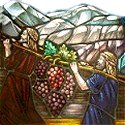
[ The following entry concerns this week's Torah reading, parashat Shelach Lekha. Please read the Torah portion to "find your place" here. ]
06.13.11 (Sivan 11, 5771) What will you choose to believe - the "spying eyes" of the flesh, or the Word and promise of the LORD God Almighty? The "eyes of the flesh" focus on this world and its possibilities (חַיֵּי שָׁעָה) and are therefore unable to discern beyond mere surface appearances. They are easily seduced by superficialities and glitter (עוֹלָם הַשֶּׁקֶר). The eyes of faith, on the other hand, "look not to the things that are seen but to the things that are unseen. For the things that are seen are transient, but the things that are unseen are eternal" (2 Cor. 4:18). Faith sees the realm of the invisible (חַיֵּי עוֹלָם): For we "walk by faith, not by sight." We are "saved by hope," but hope that is seen is not hope (Rom. 8:24-25). Faith is the foundation (ὑπόστασις) of things hoped for, the conviction (ἔλεγχος) of things (πρᾶγμα) not seen" (Heb. 11:1).
It had only been 13 months since the Israelites had witnessed the awesome power of God deliver them from Egypt. Surely the people vividly remembered how God sent ten great plagues upon Egypt, forcing the wicked Pharaoh to finally relent and let them go; surely they recalled how the Sea of Reeds was miraculously split in two as they walked across on dry land. Were they not overjoyed when they sang about how God had decisively vanquished the power of Egypt as the waters returned over the pursuing armies? And when their food ran out, had not God sent them ha-motzi min ha-shamayim - "the bread from heaven"? When there was no water to be found, had not God provided them with "living water"? Did not the Pillar of Cloud and Fire lead them to Sinai, where they felt the tremor of the great revelation from heaven - the fire, earthquakes, and blasts from the heavenly shofar? Did they not hear the very Voice of the LORD speaking to them from the thick darkness? Did not the 70 elders of Israel eat the covenant ratification meal and behold the glory of God? Wasn't it just a few months later, after Moses explained to the people the laws of the Torah and assembled the Tabernacle in their midst, that the people saw the Shekhinah Glory of God descend from the summit of Sinai to dwell over the sanctuary? Did they not fall on their faces as the fire of the LORD consumed the sacrifices on the altar?
And yet, in a sense, these displays of divine power - these "signs and wonders" - were something of a distraction for the eye of faith, since faith does not confuse the means for the end. For example, the manna that fell was meant to keep people alive, but that life was to be lived in trusting relationship with the Living God.
Recall that the Israelites had been at Sinai for nearly a year before God commanded them to begin their journey through the desert back to the Promised Land. It was at Sinai that Moses had first set up the Tabernacle, dedicated the priesthood, and taught the people the commandments of the Torah. In the "second year, in the second month, on the 20th day of the month" (i.e., Iyyar 20), the cloud lifted from over the Tabernacle and Moses dispatched the Ark of the Covenant to follow after it into the desert (Num. 10:33-6). Moses then directed the people to set out "by stages" toward the desert of Paran (in the Negev). First the eastern camp led by Judah set out, which was followed by the Levites who moved the Tabernacle. Then the southern camp of Reuben set out, followed by the Kohathites who carried the Tabernacle's sacred furnishings (e.g., the menorah, the altar of incense, etc.). Then the western camp of Ephraim set out, followed by the northern camp of Dan which served as a "rear guard."
In our Torah portion, the Israelites had trekked across the desert of Paran for several days, with their camps ordered in military precision. The Ark of the Covenant was in their midst and the Shekhinah Glory filled the desert skies. Now the people were at Kadesh Barnea (קָדֵשׁ בַּרְנֵעַ), about 11 days out from Sinai and about three days to the Promised Land, at the very edge of the conquest.... Zion was within reach!
But then a dark misgiving arose within the heart of the people... fear ... the old whisper of the enemy was heard in the desert wind: "has God really said...?" (Gen. 3:1). The enemy's voice always solicits and plays on our fears.... Satan is a liar who seeks to take our heart away. He is a bully who first seeks to intimidate us and then attempts to damn us for accepting his lies... Nonetheless, despite his temptation in the wilderness, the people's lack of trust in God's provision is altogether remarkable, and very nearly incomprehensible. The people had seen so much evidence of God's care for them, and yet they seemed to be driven by the vexation of fear. We learn later that it was the people's desire - based on their fear - to send out the spies, and surely not the result of God's command (Deut. 1:21-33). Indeed, shelach lekha (שְׁלַח־לְךָ) means "send for your own sake," that is, send them based on your request - certainly not because I command this thing... Was there a secret wound at work here? Did the people somehow suspect that God's discipline was a sign of His disfavor? Was the old accusation that Moses had led the people into the desert to die still inwardly being harbored (Exod. 14:11-12, cp. Num. 14:3)? Perhaps the idea of being in relationship with a Holy God proved to be more than what was bargained for... Salvation and provision are fine, but the fiery judgments proved there was something far more was required... After all, it is one thing to dabble in religion, but it is quite another to encounter the Reality of the Divine and entirely Holy Presence, and indeed, to become infinitely accountable to Him.
The mistrust of the people reminds us that miracles are always insufficient to sustain our faith. "An evil and adulterous generation seeks for a sign." Seeing isn't believing, but rather the other way around.... Yeshua made this point in His parable of the rich man and Lazarus (Luke 16:19-31). Even if a person should encounter someone literally risen from the dead it wouldn't suffice to impart true faith (Luke 16:31). The great sin that so angered God to say, "I swore in My wrath, They shall not enter into My rest..." was not that of the Golden Calf, as dreadful as that was, but rather the sin of unbelief.... "So we see that they could not enter in because of unbelief. Let us, therefore, fear lest, a promise being left us of entering into His rest, any of you should seem to come short of it" (Heb. 3:7-4:2).
The report given by the spies was a function of their faith: "According to your faith, be it done unto you." "Out of the abundance of the heart, the mouth speaks." Faith sees what is possible and refuses to yield to the artificiality of mere appearance. When Moses told the twelve spies to "Go up into the Negev and go up into the hill country, and see what the land is, and whether the people who dwell in it are strong or weak, whether they are few or many, and whether the land that they dwell in is good or bad" (Num. 13:18-19), he certainly did not need the opinion of the spies regarding the land and its qualities. After all, God Himself had told him the land was very good, a "land flowing with milk and honey." In a sense, Moses - and God through him - was testing the spies, to see if they had faith to see beyond mere appearances. "Even if the land seems bad in your eyes, declare that it is good... Do not rely on your initial impressions, since in order to see the promise, you must look beyond what is immediately visible."
All the spies saw the same physical phenomena: They saw the land "that devours its inhabitants," they beheld the heavy fortifications, they shrank back before the "giants" that dwelled there, and so on. The "majority" view was that the land was unassailable and that danger awaited the people... However, Joshua and Caleb exercised genuine faith and refused to regard themselves as "grasshoppers" before the enemy. Despite seeing the same obstacles, they beheld the future promise of the LORD and understood their stature as God's beloved children... The test of faith turned on the identity of the spies themselves. Were they "grasshoppers" or were they ambassadors of the Living God?
Some of the sages have said that the LORD allowed this shelach lekha - this "test of faith" - in order to judge the perfidy of the Exodus generation. In the aftermath of their failure, the LORD said, "But truly, as I live, and as all the earth shall be filled with the glory of the LORD, none of the men who have seen my glory and my signs that I did in Egypt and in the wilderness, and yet have put me to the test these ten times and have not obeyed my voice, shall see the land that I swore to give to their fathers. And none of those who despised me shall see it" (Num. 14:21-23). The midrash rabbah likens their fate to the story of a royal prince who reached marriageable age. His father then arranged a suitable match and chose a young lady of royal pedigree who was intelligent, beautiful, and charming. The son, however, insisted on first meeting the prospective mate. The father, of course, was deeply hurt by his son's lack of trust in him, and therefore reasoned: "If I refuse to allow them to meet, my son will be convinced that his doubts were justified. I will therefore allow them to meet to vindicate my choice. However, since he didn't trust me, I will not allow him to marry her." When the Israelites of that generation questioned God's word, God allowed them to send spies, to see with their own eyes that the land was truly good. However, since the people doubted His word, they would not be allowed to inhabit it....
As the Book of Hebrews makes clear, the theme of this week's Torah portion concerns the essential nature of salvation itself, which comes exclusively through trusting in God's love and grace as given in Yeshua - χάριτί ἐστε σεσῳσμένοι διὰ πίστεως (Eph. 2:8). The essence of the Torah has always been: הַצַּדִּיק בֶּאֱמוּנָתוֹ יִחְיֶה / "the righteous shall live by his faith" (Hab. 2:4; Heb. 10:38). Believing in the manifestation of the miraculous is insufficient for faith, and indeed, in the end of the age there will arise one who through lying signs and wonders will induce "strong delusion" to deceive the people of this world (2 Thess. 2:9-12). Regarding the case of the Israelites, what has struck some commentators is not so much the signs and wonders that the LORD performed on their behalf, but rather their persistent inability or unwillingness to believe... After all, truly loving the LORD with all your heart, with all your soul, and with all your strength is a miracle of a greater kind than that of splitting the Sea of Reeds. The heart of faith does not seek the miraculous, but is transformed by God's miraculous power into a testimony of His faithful love.
 |
Parashat Shelach Lekha

[ The following entry concerns this week's Torah reading, parashat Shelach Lekha. Please read the Torah portion to "find your place" here. ]
06.12.11 (Sivan 10, 5771) This week's Torah primarily concerns the infamous "Sin of the Spies" (chet ha-meraglim). Instead of leaving Sinai to immediately take possession of the Promised Land, the Israelites first called for a "spying expedition" - a tragic error that would result in the LORD's decree that the entire generation that was rescued from Egypt would die in the desert. Only Joshua (יְהוֹשֻׁעַ) and Caleb (כָּלֵב) were spared this judgment from Heaven (for more information, see the commentary on the Torah portion).
How did Joshua and Caleb escape this great national tragedy? A passage from the Talmud (Tractate Sotah 34b) states that Moses foresaw the treachery and faithlessness of the spies (meraglim) and therefore renamed Hoshea (הושׁע) to Yehoshua (יהושׁע) -- in order to remind him that YHVH (י) must always come first. Another passage from the Talmud (Sanhedrin 107a) states that the extra Yod came from Sarai (שׂרי), who had "given up" the Yod to form the name Sarah (שׂרה). In this story, the Yod appeared before the LORD and "complained" about being deleted from this righteous woman of valor. The LORD, however, reassured Yod that the day would come when it would become the first letter of a great tzaddik's name (i.e., Yehoshua/Joshua).
Rashi comments that the Sin of the Spies was essentially that of lashon hara (לָשׁוֹן הָרָה) -- "speaking evil" -- in this case, speaking against the nation of Israel (or more precisely, against God Himself, since His promise to give the land to the people was not held in sufficient esteem -- despite all the miracles the Exodus generation had witnessed). The spies terrified the people by referring to the "children of the giants" (יְלִדֵי הָעֲנָק) and the heavy fortifications of the cities in the Promised Land. Essentially the spies claimed that "the people are stronger than God" (the phrase כִּי־חָזָק הוּא מִמֶּנּוּ can be understood in this sense), and the Israelites wept all that night and wished for death (Num. 14:2).
Moses' intercession on behalf of Israel was also based on avoiding chillul HaShem (i.e., the desecration of God's Name): Wouldn't the Egyptians likewise think that God did not have the power to bring the people into the land if He should kill them in the desert? (Num. 14:12-14). Moses then reminded the LORD of the revelation of His Name YHVH (יהוה) which was disclosed to him after the Sin of the Golden Calf (Exod. 34:6-7). Appealing to the shelosh esrei middot shel rachamim - the thirteen attributes of God's mercy - is a model for our intercession for one another as well...
The LORD is El Rachum (אֵל רַחוּם), "the Compassionate God" (the word rechem means womb, see Deut. 4:31, Isa. 49:15). Practicing compassion is therefore one of the middot ha-lev (qualities of heart) that should mark our lives -- especially in light of the rachamanut (compassion) given to us through Yeshua the Messiah (Col. 3:13, Eph. 5:2).
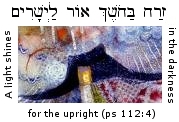
Proverbs 11:27 states: "He who seeks good [for others] seeks [God's] favor, but he who searches out evil [in others] upon him shall it come." The sages remark that he who prays for another and is in need of the same thing is answered first (Talmud: Bava Kamma). For example, when the prophet Job prayed for his friends, God restored Job's own fortunes (Job 42:10). There is always a shared blessing when we pray for others, as King David said in Psalm 35:13: "may what I prayed for happen to me!" (literally, "may it return upon my own breast" [תְּפִלָּתִי עַל־חֵיקִי תָשׁוּב]). This truth works both ways. When we seek the good of others, we find God's favor, but when we show indifference or apathy, it likewise shall "return upon our own breast."
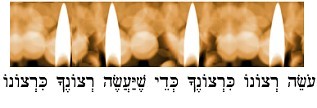
Make His will as your own,
so that He will regard your will as His own (Pirkei Avot 2:4a)
Indeed, the very "law of Messiah" (תּוֹרַת הַמָּשִׁיחַ) is to bear one another's burdens (Gal. 6:2). The word translated burden is βαρος ("weight"), from which we derive the word "barometer." This same word is used in 2 Cor. 4:17 to refer to the "weight of glory" that we will experience in Olam Haba (the world to come). Bearing one another's burdens -- taking upon ourselves some of their "pressures" -- reveals the glory of the One who bore our sin and shame at Moriah (1 Pet. 2:24).
Note: I hope to add some additional commentary regarding this Torah portion this week, chaverim. Shavua Tov!
New "Table Talk" for Beha'alotekha
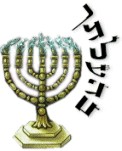
[ The Torah reading for this week is parashat Beha'alotekha. Please read the Torah portion to "find your place" here. ]
06.10.11 (Sivan 8, 5771) It is encouraging and edifying to discuss the weekly Torah portion with your family and friends during the Friday night Sabbath meal. To make it a little easier to discuss some topics, I created a new Shabbat "Table Talk" guide for parashat Beha'alotekha. The guide includes a brief summary of the Torah reading, a set of questions (with answers), and some additional topics for discussion. Hopefully this material will prompt some interesting (and enjoyable) discussion around your Sabbath table, chaverim. You can download the PDF file from the linked page (above) or by directly clicking here.
As I mentioned elsewhere, the Hebrew word beha'alotekha (be-ha-a-LOH-te-khah) comes from the root alah (עלה) meaning to ascend or "go up," though in the causative stem (such as the hiphil, as in this case), it can also mean to "offer" or "set up." The olah offering (same root) is a whole burnt offering in which the sacrificial animal is turned into smoke that ascends heavenward. All of the flesh must be consumed by fire. Likewise, God's priests and kings of the New Covenant (1 Pet. 2:9; Rev. 1:6, 5:8-9) are called to present their bodies as korban chai (קָרְבָּן חַי), a "living sacrifice," in service to the Lord (Rom. 12:1). We must die to ourselves -- die to our own sense of self-sufficiency, to our own sense of "goodness," to our all-too-human dreams, and even to our "religion" and its rituals -- in order to find life (John 12:24, Matt. 16:26). We have been bought with a price and therefore our lives are no longer our own (1 Cor. 6:20). Each day we are given the opportunity to surrender ourselves -- to "ascend into smoke" -- in service to God.... May the LORD give us all the willingness to serve Him in the truth. Amen, in the Name and Love of King Messiah!
 |
The Day is Drawing Near...

06.10.11 (Sivan 8, 5771) Reading the news of this world can be quite depressing - even distressing - though surely there is a word from the LORD spoken to the wicked rulers of this age. For those who spurn Him, there is promised a great day of reckoning from the hand of Adonai Tzeva'ot Himself... One day he will "shatter the staff of the wicked and remove the scepter of rulers" (Isa 14:5). The great Day of the LORD is near (קָרוֹב יוֹם יְהוָה), and the people of God cry out: "O God who avenges, O LORD who avenges (יְהוָה אֵל נְקָמוֹת) - shine forth! Rise up, Judge of the earth (שׁפֵט הָאָרֶץ); repay to the proud what they deserve" (Psalm 94:1-2).
"The Lord reigns (יְהוָה מָלָךְ); let the earth rejoice; let the multitude of isles be glad! Clouds and darkness surround Him; righteousness and justice are the foundation of His throne (צֶדֶק וּמִשְׁפָּט מְכוֹן כִּסְאוֹ). A fire goes before Him, and burns up His enemies round about. His lightnings light the world; the earth sees and trembles. The mountains melt like wax at the presence of the Lord, at the presence of the Lord of the whole earth. The heavens declare His righteousness, and all the peoples see His glory" (Psalm 97:1-6).
"My righteousness is near, My salvation has gone forth (קָרוֹב צִדְקִי יָצָא יִשְׁעִי), and My arms will judge the peoples; the coastlands will wait upon Me, and on My arm they will trust. Lift up your eyes to the heavens, and look on the earth beneath. For the heavens will vanish away like smoke, the earth will grow old like a garment, and those who dwell in it will die in like manner; but My salvation will be forever, and My righteousness will not be abolished. "Listen to Me, you who know righteousness, you people in whose heart is My law: Do not fear the reproach of men, nor be afraid of their insults. For the moth will eat them up like a garment, and the worm will eat them like wool; but My righteousness will be forever, and My salvation from generation to generation" (Isa. 51:5-8).
"Wait on the Lord, and keep His way (קַוֵּה אֶל־יְהוָה וּשְׁמר דַּרְכּוֹ), and He shall exalt you to inherit the land; when the wicked are cut off, you shall see it. I have seen the wicked in great power, and spreading himself like a native green tree. Yet he passed away, and behold, he was no more; indeed I sought him, but he could not be found. Mark the blameless man, and observe the upright; for the future of that man is peace. But the transgressors shall be destroyed together; the future of the wicked shall be cut off. But the salvation of the righteous is from the Lord; He is their strength in the time of trouble. And the Lord shall help them and deliver them; He shall deliver them from the wicked, and save them, because they trust in Him" (Psalm 37:34-40).
וּתְשׁוּעַת צַדִּיקִים מֵיְהוָה מָעוּזָּם בְּעֵת צָרָה
utshu'at tzaddikim me'Adonai, ma'uzam b'et tzarah

"The salvation of the righteous is from the LORD;
he is their stronghold in the time of trouble"
(Psalm 37:39)

Despite the schemes of the wicked in this moribund world, we need not fear. For those who trust Him, God can make bread rain from the skies and put coins in the mouth of fish. He can cause you to chase an army and take down the giants of the land... Be strong and let your heart take courage (חִזְקוּ וְיַאֲמֵץ לְבַבְכֶם), all you who wait for the LORD!" (Psalm 31:24). May you have a wonderful Sabbath rest this weekend, filled with God's peace that "passes all understanding." And please do not forget this ministry in your prayers. I rely on God's children to help keep me going. Thank you!
The Power of God...
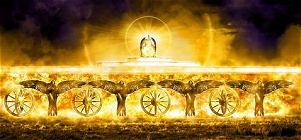
[ The following entry is related to the holiday of Shavuot ("Pentecost"), the time when a ragtag band of disciples was empowered by God to turn the world upside down... ]
06.09.11 (Sivan 7, 5771) A delusion is essentially a belief that does not correspond to reality which is held without rational warrant and is therefore immune from any possibility of falsification. Webster's Dictionary defines it as, "a persistent false psychotic belief regarding the self or persons or objects outside the self that is maintained despite indisputable evidence to the contrary." An example of a delusion is the theory of macro evolution, or the idea that the universe is an eternally self-existent, closed system of cause and effect. Another example would be the belief that value, meaning, purpose, morality, beauty, truth, love, and so on, can exist in a universe apart from God.
On the other hand, there is rational, intuitive, and empirical evidence to believe that the universe was created in time by a transcendental power that is the source of all value, meaning, purpose, and so on. Martin Heidegger asked, "Why is there something rather than nothing," which is not a question about a possible cause for an observed effect, but is a question about the underlying cause of any possible existence at all. The Scriptures reply: "For God's invisible attributes, namely, his eternal power and divine nature from the creation of the world, have been clearly perceived, because they are understood through what has been made, so people are without excuse" (Rom 1:20).
הַשָּׁמַיִם מְסַפְּרִים כְּבוֹד־אֵל
וּמַעֲשֵׂה יָדָיו מַגִּיד הָרָקִיעַ
יוֹם לְיוֹם יַבִּיעַ אמֶר
וְלַיְלָה לְּלַיְלָה יְחַוֶּה־דָּעַת
ha-sha·ma·yim · me·sa·pe·rim · ke·vod · El,
u·ma·a·seh · ya·dav · mag·gid · ha·ra·ki·a;
yom · le·yom · ya·bi·a · o·mer,
ve·lai·la · le·lai·la · ye·cha·veh · da·at

"The heavens recount the glory of God,
and the sky above proclaims the work of His hands.
Day after day it speaks out;
night after night it reveals His greatness."
(Psalm 19:1-2)

If the LORD is God, then that changes absolutely everything, and nothing is unaffected by this all-pervasive truth. As Abraham Heschel once said, "God is of no importance unless He is of supreme importance," and this is eminently true because "in Him we live, and move, and have our being" (Acts 17:28). Since reality turns on God, reasoning from another set of assumptions is really a form of delusional thinking that ultimately leads to insanity, that is, unsoundness of mind derived from folly or unreasonableness. The fool has said "in his heart" there is no God (Psalm 14:1). "The wicked boasts of the desires of his soul, and the one greedy for gain curses and renounces the LORD. In the pride of his face the wicked does not seek Him; all his thoughts are, 'There is no God'" (Psalm 10:3-4). The suppression of the truth necessarily implies an exchange for the lie, and with the lie comes deranged reasoning, slavery, darkness, and fear....
Ultimately we are living in the midst of a great spiritual war -- the war for truth. This has been the battle from the beginning. The very first recorded words of Satan (הַנָּחָשׁ) questioned God's truth: "Did God really say...?" (Gen. 3:1). In the end there will be found two types of people: those who love the truth and those who love the lie. These are the children of light (בְּנֵי הָאוֹר) and the children of darkness (בְּנֵי הַחשֶׁךְ), respectively. Followers of Yeshua the Messiah are told to "walk as children of light" / ὡς τέκνα φωτὸς περιπατεῖτε (Eph. 5:8). The children of light are called to be am kadosh - a holy people - separate from the evil engendered by the fallen world and its forces, just as the very first creative expression of God was the separation of light from darkness (Gen. 1:3-4). The children of light "hate evil and love the good," and conversely, the children of darkness "hate the good and love evil" (Psalm 34:21, Prov. 8:13, Amos 5:15, John 3:20-21). Regarding the heavenly Zion to come, it is written: "nothing ritually unclean will ever enter into it, nor anyone who does what is detestable or practices falsehood (lit. "makes a lie"), but only those whose names are written in the Lamb's book of life" (Rev. 21:27).
We have to stand for the truth, because the truth is what sets us free (John 8:32). As Yeshua said, "For this purpose I was born and for this purpose I have come into the world -- to testify to the truth. Everyone who is of the truth listens to my voice" (John 18:37). We must turn away from the lie to embrace the truth. One day all that is hidden will become manifest. "As I looked, thrones were placed, and the Ancient of Days took his seat; his clothing was white as snow, and the hair of his head like pure wool; His throne was ablaze with fire and its wheels were all aflame. A river of fire was streaming forth and proceeding from his presence; a thousand thousands served him, and ten thousand times ten thousand stood before him; the court sat in judgment, and the books were opened...." (Dan. 7:8-9).
If the devil can't kill you, he will try to make you insane... He he will attempt harass you and vex your soul. He will whisper fearful things in your ear... He will make what is small seem big and what is big seem small. He will raise dark suspicion within your soul. He will remind you of your sins to make you feel ashamed and dirty. He will hiss that you are unlovable and unworthy. He will argue on behalf of your flesh that you deserve better than this... He will tempt you to seek relief in cisterns of emptiness and futility. He will cast a spell to make you forget that you are truly a prince or princess of God Almighty... He will lie to you and console you with more lies. He will harden your heart so that it hides from others. He will drive you into loneliness and despair. Rebuke him in the Name of the LORD!
נָסוּ וְאֵין־רדֵף רָשָׁע וְצַדִּיקִים כִּכְפִיר יִבְטָח
na·su v'ein ro·def ra·sha, ve·tzad·di·kim kikh·fir yiv·tach

"The wicked flee when there is no one pursuing,
but the righteous are as confident as a lion."
(Prov. 28:1)

Da lifnei mi attah omed: "Know before whom you stand!" As Elisha said to his servant Gehazi, "Do not be afraid, for those who are with us are more than those who are with them" (2 Kings 6:16). We are surrounded by an innumerable multitude of angels, with the LORD of Hosts who rules over all. Ask the LORD God Almighty to give you the "strategic advantage" over the enemy -- for you to see his wiles, but not for him to see you.... Ask God for the armor of light that blinds eyes accustomed to darkness. How else can we fight this archenemy of our souls? We cannot fight "fire with fire," but we can appeal to the One who fills heaven and earth "with horses and chariots of fire all around" (2 Kings 6:17). "Kadosh, kadosh, kadosh, Adonai Tzeva'ot" (Holy, holy, holy is the LORD of the armies of heaven); "melo khol ha-aretz kevodo" (the whole earth is filled with His glory" (Isa. 6:3).
קָדוֹשׁ קָדוֹשׁ קָדוֹשׁ יהוה צְבָאוֹת
מְלא כָל־הָאָרֶץ כְּבוֹדוֹ
ka·dosh ka·dosh ka·dosh, Adonai Tze·va·ot,
me·lo khol ha·a·retz ke·vo·do

"Holy, holy, holy is the LORD of hosts;
the whole earth is full of his glory!"
(Isa. 6:3)

Download Study Card
Hear it sung
God told the prophet Jeremiah, "Do not be afraid of their faces, for I am with you to deliver you, declares the LORD" (Jer. 1:8). Likewise Yeshua says to us, "Behold, I have given you authority to tread on serpents and scorpions, and over all the power of the enemy, and nothing shall hurt you" (Luke 10:19). We need the courage and boldness that comes from the Holy Spirit to overcome the "giants in the land." We need the confidence of young David who beheaded Goliath in the Name of the Living God. Ask God to empower you to serve Him now... Just as salvation is "of the LORD," so is the battle of faith: "Not by might, nor by power - but by my Spirit, says the LORD of hosts" (Zech. 4:6).
The Chesed of Ruth
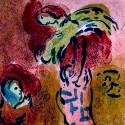
[ The following entry is related to the Book of Ruth, which is traditionally read during the holiday of Shavuot ("Pentecost"). Happy holidays, chaverim! ]
06.07.11 (Sivan 5, 5771) The Book of Ruth (מְגִלַּת רוּת) tells a marvelous story of redemptive love and devotion (i.e., chesed: חֶסֶד) dating back to the dark period of Jewish history known as the "time of the Judges" (c. 12th century BC). The story is traditionally read during Shavuot, both because the events recounted took place during the time of the spring harvest (linking it to the agricultural aspect of holiday), and Ruth herself is a picture of willing acceptance of a Jewish lifestyle (linking it to the religious aspect of the holiday). Just as Israel willingly accepted the Torah at Sinai without knowing its content (kol asher diber Adonai na'aseh v'nishmah), so Ruth gave up everything she knew to accept the Torah. Like the people of Israel, Ruth believed in order to understand, not the other way around...
While the narrative of the story is straightforward, to fully understand its spiritual implications we need to be familiar with several laws from the Torah, including the laws of redemption (Lev. 25:32-55), the laws of Shemittah and Jubilee years (Lev. 25:4, 10, 23), the laws of family inheritance (Num. 27:8-11), the laws of yibbum or "levirate marriage" (Deut. 25:5-10), and various farming laws regarding leaving food for the poor and the stranger (Lev. 19:9-10; 23:22; Deut. 24:19). In addition, we need to understand the laws of warfare for taking possession of the land, and God's repeatedly stated commandment that Israel must be holy and not assimilate with surrounding cultures (Exod. 34:12; Deut. 7:1-6; 14:2, etc.). This restriction applied not only to the seven Canaanite nations (Deut. 7:1; 20:17-18), but also to the descendants of Lot (i.e., Amnonites and the Moabites), since they showed enmity to Israel when they first came to the land (Deut. 23:4-6).
During the "days of the judges," in Bethlehem of Judah (בֵּית לֶחֶם, lit. "house of bread"), in the region called Ephratah (אֶפְרָתָה, lit. "fruitfulness"), lived a man named Elimelech (אֱלִימֶלֶךְ) and his wife Naomi (נָעֳמִי) with their two sons, Machlon and Chilyon. Apparently the names of their sons reflected the hardship of the time: Machlon comes from a verb (מָלָה) that means "to be sick," whereas Chilyon comes from a verb (כָלָה) that means "to be frail." At any rate, because of the ongoing famine in the land, Elimelech decided to lease out his land and move his family to the land of Moab, where he died shortly afterward, making Naomi a widow. Her sons later married Moabite women: Chilyon married a woman named Orpah, whereas Machlon married the heroine of our story, a young woman named Ruth (רוּת). Tragically, both of Naomi's sons died childless, thus leaving her a not only a widow, but also bereft of her children and destitute as well. (Some of the sages state that Elimelech died because he left the land of Israel to go into exile, and his sons died because they married foreign women.) Because of this series of "Job-like" tragedies, Naomi decided to return to the land of Judah, where she had heard the famine had ceased, perhaps so that she could die in the Promised Land.
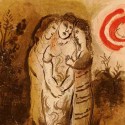
Initially both her daughters-in-law set out with Naomi on the way back to the land of Judah, though she persuaded Orpah to return back to her home. Ruth, on the other hand, "clung" to her mother-in-law and refused to leave her side. After repeatedly testing her motives, Ruth eventually told Naomi: "Do not urge me to leave you or to return from following you. For where you go I will go, and where you lodge I will lodge. Your people shall be my people, and your God my God. Where you die I will die, and there will I be buried. May the LORD (יְהוָה) do so to me and more also if anything but death parts me from you" (Ruth 1:16-17). Despite Naomi's warning that Ruth would be regarded as an outcast in Israel (Deut. 23:3) who would likely remain a perpetual widow, Ruth refused to be dissuaded. Unlike her sister-in-law Orpah, Ruth was keenly drawn to the truth of the Torah she saw in her mother-in-law, and therefore she willingly chose to leave everything behind for the sake of becoming a proselyte to the one true God. Once Naomi understood Ruth's heartfelt resolve, she accepted Ruth's decision, and the two women arrived in Bethlehem in the early spring, during the time of the barley harvest in Judah.
In order to survive, Naomi sent Ruth into the fields to glean crops, explaining to her the laws of leket and pe'ah (Lev. 19:9-10; 23:22; Deut. 24:19). Ruth "happened" to go to the fields of Boaz, a relative of Naomi's late husband Elimelech. Boaz was immediately attracted to Ruth's modesty and integrity. For instance, he was impressed that Ruth was careful to pick up only one or two stalks of grain, but no more, and also that she bent her knees when she picked up the sheaves, rather than bending down. Boaz was also impressed with Ruth's devotion to her mother-in-law, and he therefore went out of his way to help her.
Naomi understood that Boaz was a "near kinsman" to her husband Elimelech, and therefore he was qualified to redeem her land from those who presently were leasing it. Recall that the Torah allowed for the redemption of land based on its pro rata value before the year of Jubilee. The "law of redemption" required that a next of kin had the duty to redeem (buy back) the land of their close relative if the relative was in such financial difficulty that he was forced to sell it: 'If your brother becomes impoverished and sells some of his property, then his near redeemer (גאֲלוֹ הַקָּרב) shall and redeem (גָאַל) what his brother has sold" (Lev. 25:25). Since Naomi was destitute, she needed to persuade a close relative to redeem her land for the legacy of her family's name in Israel.
Now Boaz was a "near kinsmen" to her late husband Elimelech (perhaps the son of Elimelech's brother), so he was legally qualified to redeem the land. Moreover, Boaz was described as a wealthy man and therefore had the financial means be a kinsman redeemer, though he needed to be persuaded to do so. When Naomi detected Boaz's love for Ruth, however, she devised her strategy. Since the laws of inheritance stated that if a man died without a son, the inheritance would be transferred to the daughter (Num. 27:8-11), and since Ruth was the widow of Machlon, she was the legal heir of the line of Elimelech. In other words, if Boaz could be persuaded to marry Ruth, then he could redeem the land and save the family from being obliterated in Israel:
 |
After Boaz's period of "courtship" with Ruth during the weeks of the barley harvest, Naomi finally instructed her daughter-in-law to go to the threshing floor to stake her claim that Boaz should redeem her land. Since the law of "Levirate marriage" (yibbum) stated that the brother of a man who died without children had an obligation to marry the widow (Deut. 25:5-10), Ruth - as a childless widow - had the additional legal right to ask for Boaz to perpetuate the family line in Israel by marrying her. Before Boaz could do so, however, Ruth had to express her "legal intent" by claiming him as her "near kinsman." In preparation of this fateful event, Naomi instructed Ruth to beautify herself and present herself before Boaz at the end of the harvest, when the harvesters would be joyfully celebrating God's provision (likely during the holiday of Shavuot). After the feast, Ruth was told that Boaz would sleep at the threshing floor and was instructed to lay at his feet and pull his cloak over her feet to symbolize her claim. Of course nothing improper is implied by the statement that Ruth "uncovered his feet," since the threshing floor was a public place and both Boaz and Ruth were people who carefully honored the LORD.

When Boaz later awoke to find his feet uncovered, he found Ruth laying at his feet, who then expressed her claim to him: "Spread your wings over your servant, for you are a redeemer" (Ruth 3:9). Boaz was overjoyed at the prospect, though he explained that there was someone who had a precedent right to redeem her - a "kinsman nearer than I" - though the text does not name this closer relative of Elimelech (perhaps it was his brother). Ruth stayed the rest of the night at the threshing floor and Boaz promised to settle the question as soon as he was able. Before sunrise, she returned to Naomi who asked her if she was now "engaged to Boaz" (i.e., מִי־אַתְּ בִּתִּי, "who are you, my daughter?"). After learning all the details, Naomi assured her daughter-in-law that Boaz would not rest until he settled the matter that very day (Ruth 3:18).
Boaz then went directly to the gate of the city of Bethlehem and waited to discuss the matter of redeeming Elimelech's land with the closer relative who was legally entitled to make the first claim. When the man appeared, Boaz called for a minyan (a group of ten to required to settle legal questions) and presented the initial terms of redemption to him. When the man agreed to redeem the land, Boaz mentioned the additional condition that the redeemer would be required to marry Ruth the Moabitess, since she was the childless widow of Machlon (the son of Elimelech), and the law required the redeemer to "raise up the name of the dead" (i.e., raise an heir) to preserve the family line in Israel. Upon hearing this, the man said he could not redeem it, since it would mar his inheritance, and therefore he "removed his shoe" to signify that he withdrew his claim (this rather odd custom is called chalitzah: חֲלִיצָה). The legal transaction, along with Boaz's statement of intent to redeem Elimelech's land and marry Ruth, is stated in Ruth 4:8-10.
After hearing Boaz's statement of intent, the witnesses present then blessed Ruth: "May the LORD make the woman, who is coming into your house, like Rachel and Leah, who together built up the house of Israel. May you act worthily in Ephratah and be renowned in Bethlehem, and may your house be like the house of Perez, whom Tamar bore to Judah, because of the offspring that the LORD will give you by this young woman" (Ruth 4:11-12).
The book ends with the marriage of Boaz and Ruth, and the birth of their first son. The women of Bethlehem then rejoiced with Naomi, since she now had an heir to her family line and a secure future. Naomi became the baby's nurse and apparently adopted the child. "And the women of the neighborhood gave him a name, saying, "A son has been born to Naomi." They named him Oved ("servant"). He was the father of Jesse, the father of David" (Ruth 4:17). The book ends with the genealogy of the House of David, from the birth of Perez (Judah's son from Tamar) to the birth of King David.
In this connection it is interesting to see that King David's genealogy not only included the noble line of Abraham/Sarah, Isaac/Rebakah and Jacob/Leah, but it also included Judah/Tamar, Boaz/Ruth, and Salmon/Rahab. Moreover, in the genealogy of Yeshua the Messiah given in Matthew (1:1-16), only four women (besides Mary) are explicitly named: Tamar (who seduced her father-in-law), Rahab (a prostitute), Ruth (a Moabitess), and "the wife of Uriah" (i.e., Bathsheba, an adulteress). Each of these women of faith illustrate that God's love and grace overcomes His judgment... Here is a (very simplified) diagram I made to indicate some of the relationships:
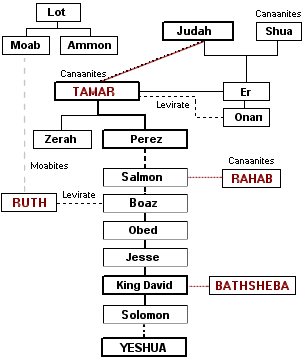 |
Ultimately, Ruth's teshuvah was accepted, even though she was an outcast - a Moabite of whom the Torah stated: "none of them may enter the assembly of the LORD forever" (Deut. 23:3). Ruth's great faith was not unlike that of the Canaanite woman who was accepted by Yeshua (Matt. 15:22-28). Both women overcome even the law of the Torah by faith in God's chesed and grace... In the case of Ruth, her faith enabled the House of David to come - and from this, the line of Yeshua our Messiah and Savior...
The blessing given to Boaz, "May your house be like the house of Perez, whom Tamar bore to Judah, because of the offspring that the Lord will give you by this young woman" (Ruth 4:12), suggests that God's plan of blessing providentially overcame the weakness and frailty of all the people involved... It is encouraging, is it not, that no matter what your personal background, God can use you to accomplish His will...
Ultimately the story of Ruth illustrates that the law by itself is unable to redeem us (as typified by the unnamed redeemer who did not wish to "mar" his inheritance), and therefore something more is needed. A true go'el (גאֵל), or "kinsman redeemer," is marked by love and compassion, just as the law of the Spirit of life (תּוֹרַת רוּחַ הַחַיִּים) is what sets us free from the law of sin and death (תּוֹרַת הַחֵטְא וְהַמָּוֶת). Ruth overcame the "letter of the law" by faith in God's redemptive love, just as Yeshua overcame the judgment of the law by means of God's greater love...
Like Ruth, we have to "go to the threshing floor" as a forbidden outsider to lay claim to the redeeming love of God. We have to say to the LORD, "Spread your wings over your servant, for you are my redeemer" (Ruth 3:9). We have to find the courage to push past the enmity required by the Torah with its commandments and ordinances to receive our healing - and to find our place within the family of God...
 |
Zechariah's Vision and Shavuot
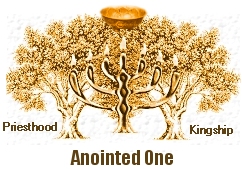
[ The Torah reading for this week is parashat Beha'alotekha. Please read the Torah portion to "find your place" here. ]
06.06.11 (Sivan 4, 5771) Our Torah portion this week begins with the LORD instructing Aaron to light the seven lamps of the menorah (מְנוֹרָה) so that they would give light "toward the face of the menorah" (אֶל־מוּל פְּנֵי הַמְּנוֹרָה). The sages understood this to mean that the seven lamps must all be "turned" toward the central stem (or shaft), which is regarded as "the face of the menorah" (Exod. 25:37; Num. 8:4).
The menorah was to be made by hammering the single piece of solid gold into shape (Exod. 25:36). Note that the word translated "hammered" or "beaten" (i.e., mikshah: מִקְשָׁה) comes from the word for "difficult" in Hebrew (i.e., kasheh: קָשֶׁה). The midrash states that the method for constructing the menorah was very difficult for Moses to comprehend, so the LORD first showed him one in the fire and told him: "This is how you will make it." Moses was unable to do so, however, so the LORD told him to take a block of gold and have Betzalel (the carpenter from Judah) throw it into the fire. After a flash of dazzling light, a menorah came out formed by God Himself. In other words, the pronoun "he" in the phrase "so he made the menorah" is said to refer to God, not Moses (Num. 8:4). Another image of "hammered" gold suggests that it is shaped and refined through pressure and testing.
The light from the menorah is a spiritual light. It was not seen outside of the Tabernacle, but only while inside the holy chamber. It enabled service to God to be performed, though it was not a light to be used for profane purposes. Notice that the six lamps faced the central lamp - a picture of Yeshua, the Light of the World whose arms and legs were "hammered" for our sins.... He is the suffering servant (shamash) who lightens everyone in the world. He is the Center and supporting trunk for the other branches (John 15:5).
In the prophet Zechariah's vision of the menorah (Zech. 4:1-10), seven "pipes" (מוּצָקוֹת) led to each of the seven lamps - 49 pipes in all - indicating the perfection of the Spirit of God (Zech. 4:2). Just as Shavuot came 49 days after the Passover to represent the "jubilee" release given by the Holy Spirit, so Zechariah's vision stated that victory and peace would come "not by might nor by power, but by my Spirit." In Zechariah's vision, two olive trees stood next to the menorah, one on the right, and one on the left (Zech. 4:2-3). The two olive trees may picture the priesthood and the kingship united in the Person of Yeshua our Messiah, or they may refer to Israel and the Church, respectively. Zechariah then exclaims, "This is the word of God to Zerubavel: 'not by physical might or power, but by my Spirit, says the LORD of Hosts'" (Zech. 4:6). Note that the portion ends with, "he shall bring forth the top stone (הָאֶבֶן הָראשָׁה) with shoutings of 'Grace, grace, unto it' (Zech. 4:7), a clear picture of the crowning glory of our Messiah and great High Priest, Yeshua...
לא בְחַיִל וְלא בְכחַ כִּי אִם־בְּרוּחִי אָמַר יְהוָה צְבָאוֹת
lo ve·cha·yil, ve·lo ve·ko·ach, ki im be·ru·chi, a·mar Adonai Tze·va·ot
"Not by might, nor by power, but by my Spirit,
says the LORD of hosts"
(Zech. 4:6)
The light of the menorah, the symbol of Divine Light, was only visible before the holy place of sacrificial atonement. The light itself came from the burning of pure olive oil - a symbol of anointing and the Holy Spirit (רוּחַ הַקּדֶשׁ). It was kindled by the hand of a man of peace and humility. Likewise, when we are given light to behold the sacrifice of Yeshua for our atonement (כַּפָּרָה), we are filled with the divine light (John 8:12; 1 John 1:7, Eph. 5:8). When we come to the cross, we can behold the truth of God's unfailing love that draws us to be united with Him.
בֵּית יַעֲקב לְכוּ וְנֵלְכָה בְּאוֹר יהוה
bet Ya·a·kov le·khu ve·nal·chah be·or Adonai

"O House of Jacob! Come, let us walk
in the light of the LORD" (Isa. 2:5)
Parashat Beha'alotekha - בהעלתך

[ The Torah reading for this week is parashat Beha'alotekha. Please read the Torah portion to "find your place" here. ]
06.05.11 (Sivan 3, 5771) The midrash states that Aaron was completely humble in his office as the first Kohen Gadol (High Priest) of Israel. It is said that his daily task to light the lamps of the menorah never became routine for him, but he remained entirely focused and reverent every time he performed this avodah.
Aaron's seemingly modest act of faithful service again indicates that what man esteems and what God esteems are very often two entirely different things. After all, since the light of the menorah only shined within the confines of sacred chamber of the Tabernacle, it wasn't even visible to those of the camp of Israel. Only the priests who served could behold this light; otherwise it remained hidden from the eyes of man...
There is a "transposition" of values, a "holy irony," in the realm of the Spirit. From God's perspective that which considered great in the eyes of men is considered of little account, and that which is considered insignificant in the eyes of men is considered of great importance (Luke 9:48). The wisdom of this world (i.e., pragmatic, self-promoting egotism, etc.) is regarded as folly before God (1 Cor. 1:20, 3:19). Therefore Yeshua "made himself nothing" and disguised himself in the form of a lowly servant (ἀλλὰ ἑαυτὸν ἐκένωσεν μορφὴν δούλου λαβών). Unlike various systems of religion that attach merit and status to those who have attained "respectable levels" of personal sanctity, those who are called great (גָּדוֹל) in the Kingdom of Heaven will be identified as the servants of all (Mark 9:35; 10:44). Like the hidden light of the menorah in the Tabernacle, the deeds of the spiritually humble are beheld inwardly, where the Heavenly Father sees in secret (Matt. 6:4). As Yeshua Himself said, כִּי מַלְכוּת הָאֱלהִים בְּקִרְבְּכֶם / "The Kingdom of God is within you" (Luke 17:21).
Spiritual pride is inherently self-flattering, self-exalting, and therefore antithetical to spiritual life. Indeed, the term itself is an oxymoron (e.g., like "bittersweet"), since genuine spirituality is always rooted in humility (עֲנָוָה). The humble soul understands its finitude and radical contingency -- and therefore understands its absolute need for God's help. Spiritual pride is really a disguised mode of intolerance, a cocksure smugness regarding matters of infinite significance, and therefore represents a state of negation toward others... It is impatient to listen, spurns self-questioning, and refuses to accept uncertainty about some of life's deepest questions. Such pride often pretends to "have the answers" regarding all the riddles and mysteries of life. Humility, on the other hand, confesses that it does not always know and is not always so sure. It is a state of openness, of listening, of being teachable. It is aware of our insufficiency, our frailties, and our limitations...
One final thought, Rashi states that the people had no real cause to complain but were simply looking for an excuse to separate themselves from God. We also use complaints to distance ourselves from others. However, the sages teach that one who doesn't appreciate what others do for him will eventually deny the good God has done for him...
Note: Here is a picture of the new moon of Sivan I took the other night:
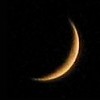
 |
Happy Shavuot! (June 7th-9th)

06.05.11 (Sivan 3, 5771) Tuesday, June 7th (at sundown) marks the end of the 49 days of counting and the beginning of the "Jubilee" of Shavuot ("Weeks" or "Pentecost"). Though it occurs on Sivan 6 on the Jewish calendar, like most other Jewish holidays Shavuot is appended with an extra day (called yom tov sheni) and therefore runs from June 7th (at sundown) until June 9th (at sundown) this year. Happy Shavuot to you!
According to the sages, Shavuot marks the culmination of the experience of redemption, sometimes called Atzaret Pesach ("the Conclusion of Passover"). Since the Exodus from Egypt led to the revelation of Sinai, the goal of Passover was the giving of the Torah to the Jewish people, just as the deliverance given by Yeshua led to the revelation of Zion so that the Torah would be "written upon our hearts." And just as God took the Jews out of Egypt so that they would be His own treasured people (עַם סְגֻלָּה), holy and separated from the pagan cultures around them, so He calls followers of Yeshua to "die to the world" and live sanctified lives. Indeed, all of the mo'edim (holidays) are connected with this event, including the fall festivals of Rosh Hashanah, Yom Kippur and Sukkot.

In light of the great Passover redemption, it is clear that Shavuot was "given" in order to express God's chesed (faithful love) for His people. It was the glory of God (כְּבוֹד אֱלהִים) that provided for the redemption in Egypt (by the blood of the sacrificial lamb), but redemption would be incomplete apart from joyous and fruitful life in the land of God's promise.... In other words, the Exodus -> Sinai connection really is the Exodus -> Sinai -> Zion connection (originally the Jews were to have gone directly to Zion under Moses' leadership). The ultimate goal of salvation - it's end or goal - was the gift of living with God as His redeemed children. This was foreshadowed by the bikkurim offering itself. Before the basket of fruit was presented to the priests, an abbreviated synopsis of Jewish history was recited by the worshipper (Deut. 26:5-11). God wanted His people to remember that the life of promise was possible only because of the chesed (חֶסֶד) and love of God (אַהֲבַת הַשֵּׁם).
Go and proclaim in the hearing of Jerusalem, Thus says the LORD, "I remember the devotion of your youth (חֶסֶד נְעוּרַיִךְ), your love as a bride (כְּלוּלָה, from כַּלָּה), how you followed me in the wilderness, into a land not sown" (Jer. 2:2)
After the LORD delivered the Jews from slavery in Egypt, He said, "Follow me into the wilderness, to an unsown land." The people willingly followed with a passion that a young bride shows her betrothed. Indeed, the story of the Exodus can be read as a great "Cinderella-like" love story. The beloved is imprisoned in far away castle, made to do the lowliest of labor, but the Lover soon appears to heroically rescue her from her distress. Together they run away into the dangerous desert where the Lover woos, protects and cares for his beloved. Eventually they pledge their undying love for one another and their married life begins... The vision of "living happily after" is the dream of Shavuot in Zion...
Shavuot Torah Readings
At the synagogue, it is customary to start the Erev Shavuot service later than usual in the evening, to ensure that the 50th day has arrived (see "counting the omer"). Many people remain awake for the entire first night of Shavuot reading a special book (tikkun leil Shavuot) that includes the first and last verses of each Torah portion, the first and last passages of each tractate of the Mishnah, and various passages from the Zohar. This book is read to "repair" the night of Shavuot from the error of sleeping so soundly before the Torah was given at Sinai that God had to awaken the Jews with shofar blasts, thunder, and lightning the following morning.
In addition to the weekly Torah reading (parashat Naso), there are special Torah readings traditionally associated with the holiday of Shavuot.
Jewish tradition states that in every generation each person should consider himself as having personally received the Torah at Sinai. The climax of the Shavuot morning service is the recitation of the famous Akdamut poem followed by the reading of Ten Commandments, when all the congregation stands to "relive" the experience at Sinai. A second Torah scroll is then taken out of the ark and the portion is read (Num. 28:26-31) that describes the sacrificial offerings made at the Temple during Shavuot, and the Haftarah (Ezek. 1:1-28; 3:12) concerns the amazing revelation of God in the form of the Throne/Chariot.
The Scroll of Ruth (מגילת רות) - a beautiful story about God's redemptive love - is read on the second day of Shavuot. As the Goel (kinsman-redeemer), Boaz was a wealthy man of the tribe of Judah (Bethlehem) who married a Gentile bride. Boaz's name means "in Him is strength," a picture of the Mashiach Yeshua, his greater Descendant, who also redeemed for himself a bride from among the nations. Among traditional Jews, the Book of Ruth is is read since the events recounted took place during the time of the spring harvest (linking it to the agricultural aspect of Shavuot), and Ruth is a picture of willing acceptance of a Jewish lifestyle (linking it to the events of Sinai).
For the Messianic Jew, Shavuot is the time of celebrating the birth of kallat Mashiach - the Bride of the Messiah (or "Church"), since the Ruach HaKodesh (Holy Spirit) was poured out to the believers in Jerusalem during this festival. But note that the fulfillment of the New Covenant (בְּרִית חֲדָשָׁה) implied that the Torah (תּוֹרָה) would be given "inwardly" and "written upon the heart" (Jer. 31:33).
הִנֵּה יָמִים בָּאִים נְאֻם־יְהוָה וְכָרַתִּי אֶת־בֵּית יִשְׂרָאֵל
וְאֶת־בֵּית יְהוּדָה בְּרִית חֲדָשָׁה׃
לא כַבְּרִית אֲשֶׁר כָּרַתִּי אֶת־אֲבוֹתָם בְּיוֹם הֶחֱזִיקִי בְיָדָם
לְהוֹצִיאָם מֵאֶרֶץ מִצְרָיִם אֲשֶׁר־הֵמָּה הֵפֵרוּ אֶת־בְּרִיתִי וְאָנכִי
בָּעַלְתִּי בָם נְאֻם־יְהוָה׃
כִּי זאת הַבְּרִית אֲשֶׁר אֶכְרת אֶת־בֵּית יִשְׂרָאֵל אַחֲרֵי הַיָּמִים
הָהֵם נְאֻם־יְהוָה נָתַתִּי אֶת־תּוֹרָתִי בְּקִרְבָּם וְעַל־לִבָּם אֶכְתֲּבֶנָּה
וְהָיִיתִי לָהֶם לֵאלהִים וְהֵמָּה יִהְיוּ־לִי לְעָם׃

"Behold, the days are coming, declares the LORD (יהוה), when I will make a new covenant (בְּרִית חֲדָשָׁה) with the house of Israel and the house of Judah, not like the covenant that I made with their fathers on the day when I took them by the hand to bring them out of the land of Egypt, my covenant that they broke, though I was their husband, declares the LORD. But this is the covenant that I will make with the house of Israel after those days, declares the LORD: I will put my Torah (תּוֹרָה) within them and I will write it on their hearts.
And I will be their God, and they shall be my people." (Jer. 31:31-33)
Torah Given Inwardly...
When the Jews exclaimed at Sinai, kol asher dibber Adonai na'aseh ("all that the LORD speaks we will do" [Exod. 19:8]), they signified an abandonment to God's will for their lives. In other words, they first chose obedience before they understood the terms of the covenant. Only later, after Moses wrote the book of the covenant (sefer habrit) did they add v'nishmah (and we will hear/obey, from shama [Exod. 24:7]). The Jews first chose to do whatever the LORD commanded and then hoped to "hear" these words in order to understand their meaning. It is the quality of hearing that matters. As Anselm said, we believe in order to understand. The decision to serve God comes first, and then comes understanding. This principle is still true when we come to the greater mountain of Zion.
According to Jewish tradition, God created the universe itself on the condition that Israel accepted the Torah. By extension, God created the universe for the sake of imparting Ruach HaKodesh and adopting us as His children of God through Yeshua the Messiah. The promise of the New Covenant is that the Torah would be given "within our inward parts" and written upon our hearts (Jer. 31:31-33). Each of us is called to likewise order our lives as if the existence of the universe depends upon our faith. Abraham was a tzaddik on account of his faith, and we are likewise called to "receive the gift of the Holy Spirit" (Acts 2:38).
Jewish Midrash states that the Ten Commandments were spoken all at once, in a single divine utterance, and then repeated one-by-one to the Israelites. Unlike the other commandments of the Torah, these ten are unconditionally given. The LORD identified Himself as Elohim (not YHVH) when proclaiming them, indicating His role as Judge of the universe, and He used the second person singular (not plural) for the verbs: You shall not steal..." Please review the Ten Commandments pages on this site for some additional commentary.
The holiday of Shavuot is one of the shelosh regalim (three pilgrimage festivals) given in the Torah (Exod. 23:14-17; Deut. 16:16) and therefore reveals profound spiritual truth for followers of Yeshua (Luke 24:44; 2 Tim. 3:16). God did not want us to miss the significance of this holiday, since it expresses the freedom and truth of the New Covenant of Zion. There is a "zeal for the law" in our lives, but it is not the zeal that is displayed in outward forms of righteousness. Since Yeshua is the "Voice of the Living God speaking from the midst of the fire" at Sinai (Deut. 5:26), the of "tongues of fire" given to His followers comes from the fire of God's glory given at Zion... The New Covenant is "Messiah in you," the hope of glory (Col. 1:27), and is the means of the heart's transformation both to will and to do God's good pleasure (Phil. 2:13).

Note: We celebrate Shavuot by lighting yom tov candles at sundown before eating a "simchah" meal (with dairy dishes and cheesecake for dessert, etc.). After dinner, we recite the Ten Commandments and discuss the Book of Ruth.... We also look at portions from the Gospels/Acts that deal with the advent of Holy Spirit and how the Holy Spirit writes the Torah upon our hearts... From our family to you: Shavuot Sameach - "Happy Shavuot!" May this be a time of renewal and great joy in your lives...
New "Table Talk" for Naso

[ The following is related to this week's Torah reading, parashat Naso ("lift up!"). Please read the Torah portion to "find your place" here. ]
06.03.11 (Sivan 1, 5771) It is encouraging and edifying to discuss the weekly Torah portion with your family and friends during the Friday night Sabbath meal. To make it a little easier to discuss some topics, I created a new Shabbat "Table Talk" guide for parashat Naso. The guide includes a brief summary of the Torah reading, a set of questions (with answers), and some additional topics for discussion. Hopefully this material will prompt some interesting (and enjoyable) discussion around your Sabbath table, chaverim. You can download the table talk guide here.
אנכִי אָנכִי יְהוָה וְאֵין מִבַּלְעָדַי מוֹשִׁיעַ
anokhi anokhi Adonai, v'ein mi-baladai moshia

"I, even I am the LORD, and besides me there is no Savior"
Isa 43:11

Note: Please read the Book of Ruth to prepare for the great festival of Shavuot in anticipation of Shavuot (Pentecost) this coming Tuesday. And "Keep growing in the grace (χάρις / חֵן) and knowledge (דַּעַת) of our LORD and Savior (מוֹשִׁיע), Yeshua the Messiah (הַמָּשִׁיחַ). To him be the glory both now and to the day of eternity. Amen." (2 Pet. 3:18)
Loving the Stranger...
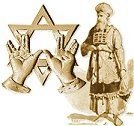
[ The following is related to this week's Torah reading, parashat Naso ("lift up!"). Please read the Torah portion to "find your place" here. ]
06.02.11 (Iyyar 28, 5771) After taking a census of the clans of the Levites who would help the priests perform their duties at the Mishkan (Tabernacle), Moses instructed the Israelites to remove anyone who was ritually unclean from the camp. He then instructed that anyone who had wronged another to confess their sin, make restitution for the full amount (plus one-fifth), and offer an guilt offering for atonement. Notice, however, that this law of restitution applied not only to one's fellow Jew, but also to "strangers" (i.e., gerim: גֵּרִים) as is indicated by the immediately following verse: "But if the man has no next of kin to whom restitution may be made for the wrong, the restitution shall go to the LORD..." (Num. 5:8). The sages ask, "Is there anyone in Israel who has no next of kin - no brother, no nephew, no distant relation going back to Jacob? This can only refer, therefore, to a stranger, since he has no heirs" (Sifrei). If for some reason the stranger cannot be compensated for his loss, restitution must be made to the LORD, which implies that stealing from the stranger is the equivalent of stealing from God Himself.
Recall that the "mixed multitude" (i.e., erev rav: עֶרֶב רַב) were those Gentiles who tagged along with Israelites during the Exodus from Egypt. Like the Jewish people, they had literally left everything behind them in the hope of beginning a new life of freedom. When the Israelites were camped at Sinai and the tribes were brought into formation, however, there seemed to be no provision made for these people. Indeed, these "strangers" were social outcasts from the camp of Israel who were ineligible to serve in the army or to partake in the services of the Tabernacle. There is no mention of their location among the camps of Israel, nor is there any census recorded of their numbers. We can only surmise that they lived a hardscrabble existence as they wandered with the camp of Israel in the desert...
The midrash sees a direct connection between the expulsion of the unclean among the camp of Israel and the law of restitution as applied to the stranger: "For them that honor Me, I will honor, and them that despise Me shall be lightly esteemed" (1 Sam. 2:30). Who were those who honored God? The proselytes... Who were those who despised God? Those who worshipped the Golden Calf. How did God repay them? He smote them with leprosy and venereal disease and expelled them from the camp. How did God honor the proselytes in return? He inserted the section warning us to look after them immediately following the section dealing with expelling the lepers from the camp. From this we learn that God repels the sinners of Israel while befriending the proselytes who seek Him. They are protected by the same law as the Israelite, and whoever takes from them by violence is dealt with just as if he had taken from an Israelite" (Bamidbar Rabbah 8:3).
So even at the beginning of Israel's national history we see God's care for the "stranger" who dwelled among his people. Regarding the law of Passover, the LORD stated, "There shall be one law (תּוֹרָה אַחַת) for the native and for the stranger who sojourns among you" (Exod. 12:49). "You shall treat the stranger who sojourns with you as the native among you, and you shall love him as yourself" (Lev. 19:34). The sages ask, why does God love the stranger? Because they have no hereditary or family title. If someone truly wants to become a righteous person, God honors them as if they were the very priests of Israel. Proselytes are what they are simply out of love for God, just as Ruth was made a mother of the Messiah by means of her love for God alone. As it is written, "The LORD loves the righteous; He protects the stranger."
יְהוָה אהֵב צַדִּיקִים יְהוָה שׁמֵר אֶת־גֵּרִים
יָתוֹם וְאַלְמָנָה יְעוֹדֵד וְדֶרֶךְ רְשָׁעִים יְעַוֵּת
Adonai o·hev tzad·di·kim, Adonai sho·mer et ge·rim
ya·tom ve·al·ma·nah ye·o·ded, ve·de·rekh re·sha·im ye·av·vet

"The LORD loves the righteous; the LORD watches over the strangers; he upholds the widow and the fatherless, but the way of the wicked he turns upside down"
(Psalm 146:8-9)

Concerning the obligation to love the stranger and treat him with righteousness, Rabbi Jeremiah said: "How can you know that the Gentile that practices the law is equal to the high priest? Because it is said, "which, if a man do, he shall live through them" (Lev. 18:5). And it says, "This is the Torah of man" (2 Sam. 7:19). It does not say, "the law of the priests, Levites, Israelites," but "This is the law of man (תּוֹרַת הָאָדָם), O Lord God." And it does not say, "Open the gates and let the priests and Levites and Israel enter," but it says: "Open the gates that the righteous may enter" (Isa. 26:2). And it says, "This is the gate of the Lord, the righteous shall enter it." It does not say, "The priests and the Levites and Israel shall enter it" (Psalm 118:20). And it does not say, "Rejoice you, priests, Levites, and Israelites," but it says,"Rejoice you righteous" (Psalm 33:1). And it does not say, "Do good, O Lord, to the priests and the Levites and the Israelites," but it says "Do good, O Lord, to the good" (Psalm 125:4). So even a Gentile, if he practices the Torah, is equal to the high priest (Sifra 86b; Baba Kamma 38a).
Regarding the law of the stranger, there are two applications. First, we should remember that "outsiders" are beloved by God and often present a challenge to our supposed identity as God's favored children. The "caste system" within ancient Judaism was intended to humbly serve the greater community, just as Yeshua likewise taught us to love one another, and "if anyone would be first, he must be last of all and servant of all" (Mark 9:35). After all, the primary role of a "priest" was to enable others to draw near to the Divine Presence, not to exclude them from it, and those who serve God in the truth will always seek to heal the sense of "estrangement" from God. Secondly, those who were not raised with the benefit of Jewish heritage but who have genuinely laid hold of Yeshua as their Mashiach and Savior "have a place at the table" in God's Kingdom. "Remember that you were at that time separated from the Messiah, alienated from the commonwealth of Israel and strangers (gerim) to the covenants of the promise, having no hope and without God in the world. But now in Yeshua the Messiah you who once were far off have been brought near by the blood of Messiah. For he himself is our shalom, who has made us both one and has broken down in his flesh the dividing wall (mechitzah) of hostility, by destroying in his own body the enmity required by the Torah with its commandments and ordinances. He did this in order to create in union with himself from the two groups a single new humanity and thus make shalom, in order to reconcile to God both in a single body that was executed upon the cross by killing that enmity. For through the Messiah we both have access in one Spirit to the Father. So then you are no longer strangers and aliens, but you are fellow citizens with the saints and members of the household of God" (Eph. 2:12-20).
A "stranger" is anyone from whom we would withhold genuine respect and love. As Martin Buber once wrote, it is only through the "thou" a person becomes "I." In other words, we are incomplete people if we live in fear of others and deny their essential dignity and worth before our Heavenly Father. We can't regard someone else as a stranger without becoming a stranger ourselves... The message of our hope is "God so loved the world," but that world includes the habitation of many who are strangers to the grace and kindness of God. God has commissioned us to be emissaries of his grace and love to the world of the stranger... May we heed the call welcome all who are thirsty to come and drink from the waters of life.
 |
|














































